#like those series are admirable and deserve their praise
Explore tagged Tumblr posts
Text
I love indie animation as much as the next person but hell.
I miss when people talked about and appreciated the craft as a whole (from daily shorts on yt/newgrounds, to storytime animators, to student films, to some 10 minute pilot some kid made for $100 bucks tops on mspaint) and didn't just limit the conversation to the same five budgeted series that have the same close connections. It's ironic as much as it is a bit frustrating.
#animation#indie animation#if u know u know#that isnt to say i dislike those series#im just frustrated with how things are starting to feel limited and exclusive#and fans often rely on fandom interests in terms of what they support/hold as “pioneers” or a new idea of what minimal qualities should be#like those series are admirable and deserve their praise#but now everyone thinks u need big kickstarters and industry quality preproduction and a 30 minute pilot for proof of concept#and the ones that i see that dont follow that and have the same quality as old Cartoon Network pilots -funny enough- get glossed over#dont get it twisted; i aint suggesting indie animation is getting monoplized or anything#its just a lil discouraging#“indie *industry*” hahaha oh no..
35 notes
·
View notes
Text

sugar daddy bar!owner john price x sugar baby!waitress series
🥀 |warnings: +18, laaargw age gap (reader is 21 and price is in his 40s), fem!reader, sugar daddy/baby relationship mentioned, not smut but suggestive.
price thought a doll like you deserved a grown, strong old man like him to treat you like a princess — spoil you rotten, wrap you up in bubble wrap and take care of you. You didn’t need to work, get your pretty hands sore and tired from pouring drinks all the time. he’d give you all the money you needed to pay off your college and to get all the pink, girly things you liked so much, ribbons and all. You just needed to sit cutely on his lap, to be his, and he’d give you the whole world. He was in his 40’s, you had only recently turned 21, a flower on the prime of her blossoming youth, who could give an old, worn out man like him some sugar.
that’s why he offered you to be his sugar baby. that offer, made you flush on the spot — he was so confident and composed, unfazed by his own words. The moment he saw redness spread over you cheeks, he knew he had you. His mustache twitched, his salt and pepper beard stretched as he wore an amused, lazy smile. you were always so obedient and compliant to him, always chirping a “yes sir” to anything he’d ask or tell you to do, a sweet, young, too young lil thing, eager to earn his praise, to feel those goosebumps trail down your skin when he muttered a gruff, deep “good girl”, you’d be the perfect submissive, you’d have it in you to be trained already, even in your innocence and inexperience..
..but, you’d initially declined his offer, because “I want to earn that money, sir, and I’d feel bad if you just..gave it to me like that”
oh, how honest, naive, innocent and pure you were. He admired that about you, but you could see it in his eyes, the way he cocked his thick, dark brown brow upward, that he didn’t believe you’d cling onto those words for long. He knew you were just too shy to accept, but you wanted to. You wanted to be his pretty, little girl. and he was right, as always. One particular night, you’d found a moment to lean your arms against the wooden counter and just breath. You’d been studying all morning, head buried in your notes, and when you got to the bar, you found dozens of soon to be drunk men ready to order alcohol and ask you to bring them ashtrays.
you wanted nothing more than go back home, snuggle in your pink, soft blankets and read your so loved books — it had just been a draining day, you enjoyed your job, but to be honest with yourself, the thing you liked the most was feeling john’s attention and eyes on you during your whole shift and maybe you could finally have someone provide for you.
so, that’s how you found yourself in front of his office door, hesitating lightly while millions of tiny butterflies flew around in your chest, your cheeks as red and warm as ripe strawberries under the summer sun.
knock, knock.
he’d recognized that knock. A feeble, light thud against wood. That couldn’t possibly have been Simon, whose hand could make the whole door shatter down with a single knock, nor Soap’s — bloody hell, that man never bothered to knock at all, he’d just break in.
so he wasn’t surprised to see you, standing meekly in front of his large, wooden desk, the hem of your skirt hugging your milky, bare thighs, your fingers fidgeting together and your eyes looking down at his sitting stance, shy and timid.
“what is it, doll? need ol’ price?” his voice was so rough, so husky, you wondered how it would sound from between your thighs, or from behind you, while his large palm pulled your hair to make you arch against him.
you blinked once, gathering courage to ask for what you’d secretly been daydreaming about, your boss, old enough to be your father, aging like the finest wine, showing you things you’d never ever experienced.
“about your offer, sir” your cheeks were burning, flaming up, “if I accept, can I still come here and help you around?”
“if you accepted,” he almost didn’t even let you finish, eyes already darkening at the thought, a wave of desire rushing through his weary, battle scattered heart, “you could do whatever you wanted, angel, you’d just have to say please”
#john price x y/n#john price x reader#john price imagine#john price x f!reader#john price x female reader#captain price x female reader#captain price x reader#cod#price x female reader#captain price smut
915 notes
·
View notes
Text
the runecaster diaries - potential suitors



❀ inspired by the apothecary diaries ❀ [various! blue lock x fem! reader. royalty & magic au.]
By some twist of misfortune, you find yourself in the position of servant girl in Emperor Noa’s grand palace. Through a series of even more unfortunate events, you find yourself to be the general runecaster on the palace grounds, at the beck and call of all the potential heirs to cast whatever spells their hearts desire.
(you can read the full introductory piece to this series here.)

Emperor Noa's Court
❥ Lord Loki is the kind, benevolent overseer of the Gold Pavilion, where you currently reside. He’d interacted with you a few times during your time serving as an attendant in Snuffy’s residence, though he’d already developed a good impression of you thanks to Snuffy and Charles speaking highly of you. He often drops in on your training sessions with Charles (something the boy loves to repeatedly tell you he didn’t do in the past) and can be a bit prickly when the other heirs come into the Gold Pavilion requesting your services.
❥ Lord Itoshi— Sae, that is— is the overseer of the Jade Pavilion, and his cold, disinterested demeanor draws in suitors like moths to a flame until they are eventually met with his arrogant and condescending nature. It’s not often that you find yourself in the Jade Pavilion, but when you do, the task that he has requested your assistance with has less to do with casting and more to do with interrogation and piecing together parts of a mystery. During your debriefs following an investigation, it almost feels as though Lord Itoshi knows more than he lets on but withholds his knowledge for whatever reason, causing you to overexplain yourself and extend your stay.
❥ Lord Kaiser, the overseer of the Cerulean Pavilion, is equal parts adored and loathed by those residing in the palace, as well as the kingdom at large. His arrogance, like Lord Itoshi’s, is well-deserved, and his masterful mask carved from charisma has suitors throwing themselves at the doorway of his villa. Those within the palace know him for the cold, cruel individual that he is, though, and not even saving his life has earned you his respect. He begrudgingly allows his personal attendant and caster to request your help with certain spells, and insists that his lingering when you’re in the Cerulean Pavilion is just to ensure you don’t mess anything up. The more you’re requested to report to the Cerulean Pavilion, though, the more you realize that the tasks you’re assigned are ones that Alexis could handle just fine by himself— which always leaves you wondering why Lord Kaiser has assigned this to you in the first place.
❥ Knight Alexis is Lord Kaiser’s brilliant personal attendant, and the most skilled runecaster in the entire palace excluding those who are assigned to Emperor Noa. You’ve always admired his work from afar, keeping your dwindling skills sharp by trying to figure out what materials and casting methods he used in his spells during your time as an attendant. Working with him makes him even more impressive, though, and he often grows flustered when you watch him cast with wide eyes filled with admiration. You’d been warned by Grim in the past that Alexis tends to get territorial where his work and his lord are concerned, and though you’d gotten that impression at first, it’s hardly there anymore. He doesn’t mind working with you at all— if anything, he seems to perk up at the sight of you crossing into the Cerulean Pavilion, and loves to present his other projects to you for you to give feedback on (and, hopefully, to praise).

Emperor Ego's Court
❥ Lord Isagi is the shining hope of Emperor Ego’s heirs, the poster child of what every successor should strive to be. Polite, charming, skilled, and above all else, genuine, Isagi Yoichi is definitely your top pick for the throne, and you don’t even live in his kingdom. And just when you think he can’t get any better, you catch him heatedly arguing with Lord Kaiser in the Cerulean Courtyard— and winning. Lord Isagi spends a lot of time in the Gold and Ruby Pavilions, so it’s not uncommon for him to seek you out and ask to be trained in casting, since it’s his weakest point. You don’t think he’s giving himself enough credit, though; he’s a very quick learner and performs new spells almost as if he knows exactly what he’s doing, but checks with you to make sure he’s doing it right, just in case.
❥ Lord Itoshi— Rin, that is— is a picture-perfect snapshot of elegance, grace, and beauty, up until the point where he opens his mouth and proves to everybody in the palace that the condescension runs in the family. His behavior is incredibly similar to his brother’s, though he seems to be a bit more openly competitive and aggressive than Sae— at least, that’s the impression you develop of him when you run into him while carrying out an investigation for Sae that he insists he can perform and solve for his brother quicker than you can. Against your will, it ends up becoming a recurring thing, and at this point, you can’t tell if he’s seriously trying to solve the case faster than you, or if he’s actually trying to work with you. It’s not like you can ask him— you like him better when he’s being cooperative and would rather not piss him off, thank you very much.
❥ Lord Reo— Mikage, really, but he insists against being called that— is charismatic, sociable, and was raised to be royalty from the moment he was born. However, you hear from the servants of Ego’s other heirs that he’s a deeply jealous individual, which can sometimes be as inhibiting to him as it is encouraging. You bear witness to this when he’s prickly with you during your first meeting, obviously upset that his personal caster is cooking up the stupidest spells known to mankind with you rather than tending to his young master. However, things seem to smooth over after that, as he comes to be impressed with the work you get accomplished with Nagi, and even the work that you accomplish for him on your own— which he seems to be requesting you do more these days. Nagi often whines that you’re gonna replace him, which you think is a joke, until Lord Reo insists that two personal casters are better than one. Well, if he’s serious, he’ll have to take it up with Noa, you suppose.
❥ Lord Chigiri possesses the kind of beauty men start wars over, and his confidence in his skills and appearance only draws others in more. To your delight (and surprise— the prettiest heir around these parts is also the prickliest), he’s also rather friendly and loves gossiping, often bribing information about Noa’s heirs out of the palace attendants. You’re no exception to this, and the first time he requests your assistance, a spell that should only take a single morning to execute ends up taking the whole day because you’re too busy complaining to him about all the arrogant heirs and relaying to him your most dismal encounters with them. Your gossip sessions end up becoming a weekly meeting, disguised as “tune-ups” if the other heirs ask. Lord Reo ends up attending them at some point, and after overhearing a conversation between the two while actually working through a spell, you suspect that the two are scheming to convince Ego to try and get Noa to release you to their palace.
❥ Knight Bachira is a bundle of energy that you believe would fuel a million spells if he could be harnessed. Eccentric and cheerful, he somehow both contrasts and compliments Lord Isagi perfectly as his personal attendant. One day, when Lord Isagi approaches you with a private request, you’re surprised to learn that Bachira’s power doesn’t come from runecasting, but rather, from a curse— he was born with a demon latched onto his spirit, which had caused him and his mother to be exiled from their village. Bachira ends up becoming interested in you when start teaching Isagi spells meant to help Bachira control and coexist with the beast rather than suppress it. He can be a bit much to handle when you’re trying to carefully brew a spell, but you can’t bring yourself to be upset when his laughter never fails to brighten up your workshop.
❥ Knight Nagi is just as brilliant of a runecaster as Alexis is, though he has one fatal flaw: he’s lazier than a dog. Your first few assignments from Lord Reo are agonizing, as he doesn’t help you at all and you have to do the work of two casters all on your own. It’s not until he catches you crouching behind some bushes in the Gold Pavilion, cackling to yourself as you put together a new spell to be used in your and Charles’s escalating prank war, that you finally catch Nagi’s interest. After that, Nagi can often be spotted with you crouched over a brewing station, the overgrown man draped over you as you two bicker over which combination of ingredients would yield the most sinister effects.

all posts for this series will be tagged with #ceru.runecaster
my requests and comments are open if you want to let me know who'd you like to see an interaction with! if you'd like to be added to a tag list, please feel free to comment on this post! :>

#bllk x reader#blue lock x reader#blue lock x you#bllk x you#x reader#julian loki x reader#michael kaiser x reader#kaiser x reader#itoshi sae x reader#sae x reader#alexis ness x reader#ness x reader#isagi yoichi x reader#isagi x reader#itoshi rin x reader#rin x reader#mikage reo x reader#reo x reader#chigiri hyoma x reader#chigiri x reader#bachira meguru x reader#bachira x reader#nagi seishiro x reader#nagi x reader#ceru.writes#ceru.runecaster
193 notes
·
View notes
Text
LXST; RECORD TWO

[NEW UPLOAD FROM ATEEZ]
LISTEN TO 'TAKE ME BACK TO EDEN' NOW ON YOUTUBE (until 4:38)
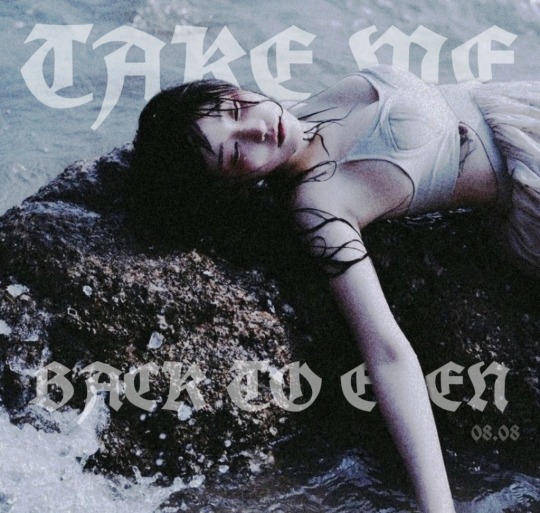
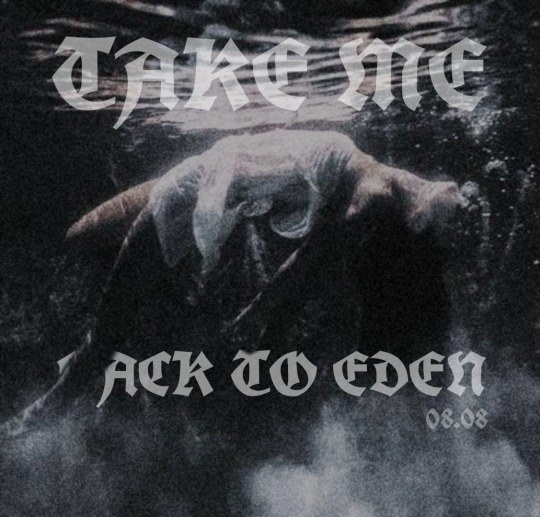
Liked by m.by_sana and 1,203,389 others
ateez_official_ LXST; Record Two
#ATEEZ #애이티즈 #HIMARI #히마리
View all 890,839 comments
sleep_token So glad our fans brought this ethereal song to our attention 🙌🏻 If you're ever looking for someone to collaborate with we'd be more than willing
hynjinnnn i'm so grateful you trusted me to photograph you and bring your ideas to life, it was such an amazing experience 💛the song is so beautiful that i might be responsible for half of its steams right now, save me a seat at the next tour stop🙏
teezify these photo concepts just get more breath taking and the fact that the water is used to portray the emotions of the song...🤌✨️
youremystar an alternative rock/progressive metal song with HER voice, we really are winning guys 🤭 and the creative direction was all her so it really makes those pics more impressive, I can't even explain how I feel looking at them
himarry.me We as a society underestimate just how creative her mind is...she replaced the vowel by an x to make it a series with different themes 🤯Thank you for working so hard our maknae, but please remember to rest 💕
bluebrry she actually performed it at the Toronto concert...I got chills. not only was she acting but she was singing live the entire time, also Mingi as the toxic masked figure from the video?? this stage alone should get an award 🤩👏🏼
08 July 2024 • See Original
Industry Reactions
Mingi made sure his Instagram story was filled with praise for his girlfriend 'from the moment this song started playing in the studio I felt like I was diving into her heart. I'll never grow tired of hearing that angelic voice even in the depth of my dreams so if you won't stream the song, I will ���Tiny, please show lots of love to my angel, she deserves it especially after the amount of work that went into this track alone. She fell asleep so often in her studio writing everything from lyrics to the music video directions that I had to make her sleep in mine most nights just so I could bring her home later'
J Hope made an unexpected post on Weverse 'I don't usually make song recommendations but I feel like people need to hear this one at least once in their life. We watched her grow up so I was able to see the amount of potential her production had and yet I never thought to hear something so out of the ordinary, she's really advanced to a new level'
American singer Halsey showed fondness for her friend's younger sister on X 'I've only gotten the chance to meet this sweet girl twice yet she's been stuck in my mind ever since and this song is proof of her impact. It goes beyond the restrictions of her industry, it draws your entire being inside the track almost as if under water. I can't properly explain this song so go stream it!'
Woozi surprised fans with news of their friendship on Weverse 'There have been many talented producers who worked with me in the past but Himari instantly stood out to me with the brilliance of her musical mind. We got to talking more as friends and she told me that she didn't take classes until their early debut days, she just watched people like Hongjoong and Yoongi hyung. When producers say that this girl is a genius we really mean it. Take Me Back To Eden is a mix of two different genres yet she makes them work so well together with just the use of her voice, that's a true artist, someone with a creative vision out of what people expect or are comfortable with'
(G)I-DLE leader and producer Soyeon expressed respect on an Instagram story 'Usually senior idols are the ones serving as role models for their juniors, but after hearing Take Me Back to Eden I have to admit that despite being three years older, I really do look up to Himari. What she has isn't just about natural talent, it's hard work, constant learning, harmony in a team, long hours...a lot of us producers admire her work ethic. Her creativity is absolutely mind blowing, she's without a doubt one of the pillars of this generation and I'm sure younger idols will talk about her for a very long time ❤️'
Netizen Reactions
@/bulleobulleooo on X 'That one scene with Apollo when it turns into a man hits so hard...because the sound was beautiful but the chords were cutting her fingers the entire time. Relationship wise that means he was whispering loving things in her ear while destroying her. Omg then the part where she's singing 'Grow back your sharpest teeth, you know my desire' in tears while he's making her look up at him?? This MV is so meaningful'
@/ateenypresent on X 'this is definitely about being lost in someone's corruption 🤔 look at the details, she even has bruises around her eyes like she was burnt by the 'funeral pyre' she keeps talking about being drawn to'
@/himaswife on X 'Hear me out, I think this whole project is about the evolution of toxic love. The first track was about desire for another person, lust, or being drawn in by someone, this one hints to being so blinded by toxic love (of the person she was drawn to) that she loses herself to the point of wanting to go back to previous innocence yet not being able to due to still being trapped by the other. The next one might be called last and talking about the separation from that person.'
@/secretlyjjoongrami on X 'Wait Eden is the beginning, where everything started, but it also represents perfect harmony. With all the clues in the video I think she's been corrupted by the masked man and broken to the point where everything inside her is in chaos. Maybe that's why her dress when he's around is black and torn, but the reflection in the mirror is wearing white, same thing when she's in the water...'
Min Siblings Updates
Yoongi's private message 'My Himari, please know that I'm more than sorry for everything happening at the moment I promise I'll fix it. This is very unfair to you, I can only imagine how stressed everything must make you right now, how much my stupidity bled onto your life. I wanted you to know how proud I am that you're working so hard especially on this incredibly creative project. Your soul is pure art itself, I hope you'll always be able to express yourself like this. Your big brother is so sorry, I love you, always ❤️'
Hanzo's private message 'Don't worry I streamed your new song the second the notification appeared on my screen, Haneul heard it and won't stop asking for me to 'play auntie's song' ㅎㅎ This is a beautiful project but please remember to rest, Hongjoong says he's worried that you have more nightmares lately. Pretty please send me the next track before it comes out, for your big brother that you love so much 🥺My amazing, artistic little tiger, I love you 💕Remember to send me a message when you land in Rosemont!'
Translated from Korean by Google

#ateez au#ateez imagines#ateez 9th member#ateez extra member#ateez female member#kpop oc#himarinews♡#himarilore♡#HimaSocial♡#HimaInsta♡
49 notes
·
View notes
Text
Crown’s S Class Mission - Roger Barel (Bitter End)
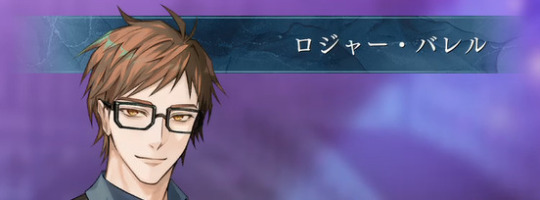
As usual, can’t guarantee 100% accuracy on this.
Roger: Hold up. Not gonna let you kill my cute student. Now then, it’s time for Instructor Roger’s fun and exciting punishment.
Master of the estate: Oliver, shut that guy up!
Instructor Oliver: The one who needs to shut up is you.
Oliver grabbed the man and pinned him to the floor.
Master of the estate: *cough* Wha-what are you doing!
Instructor Oliver: I can’t lie to myself anymore. That’s all.
Roger: Capture everyone involved.
--
What awaited was an unimaginable scene.
Roger used rigorous muscle training to punish those involved.
When they were no longer able to stand, they were handed over to the police.
Kate: The Beauty Muscle Club has pretty much dissolved.
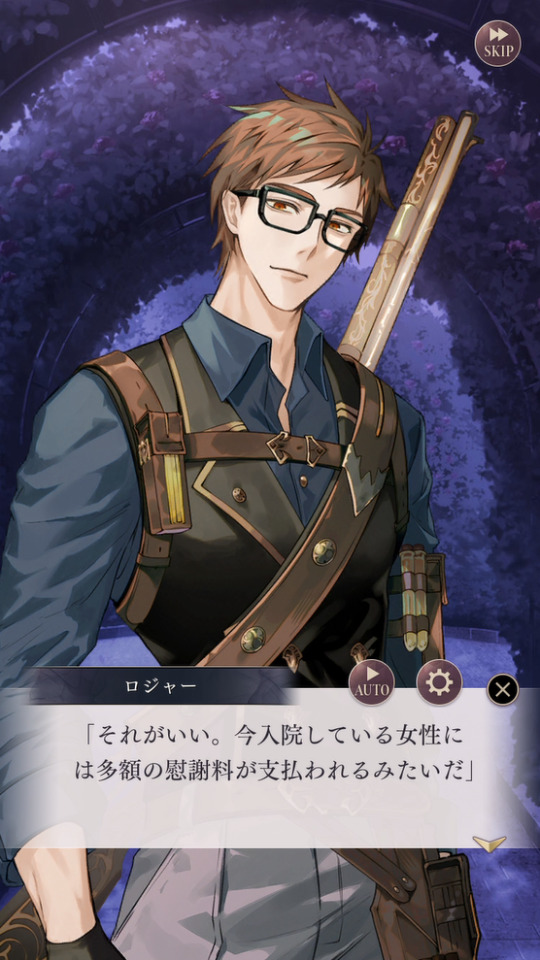
Roger: That’s good. And all the hospitalized women will be compensated.
Kate: While money won’t fix their situation…I hope it’ll help, even if just a little.
Oliver the instructor also came forward as one of the accomplices.
After atoning for his crimes, he planned on running his own sports gym.
He wanted to establish a place for women to work out together.
???: Um, excuse me…
Kate: Emilia…
Emilia’s wise gaze caught mine when I turned around.
(...If she overheard us, she knows that she got deceived, doesn't she?)
(...What can I say to her—)
Emilia: Um, thank you so much!
Kate: Huh?
Emilia winked and smiled.
Emilia: I’ve faced a series of disappointments, but I can’t let that get me down.
Her strength revealed how much she had gone through in her life.
Kate: …I’ve also faced a series of disappointments. I could only think about how useless and pathetic I was. But I can’t stay depressed.
Emilia: I agree. I’ll see you around. Take care of yourself, Kate.
While I waved goodbye to Emilia, I noticed Roger’s gaze on me.
Kate: What is it?
Roger: Nothing. Just thinking about how you’re growing into a fine woman.
Kate: D-don’t praise me out of the blue. Besides, it’s not like you raised…
Roger: Yeah, yeah. Anyway, as a reward for growing up well, I’m taking you out somewhere nice.
--
Roger took me to a restaurant by Big Ben.
Roger: Been coming here ever since Ellis told me about it. Basically, everything here’s pretty good.
(...Roger brought me to such a nice restaurant)
Alarms bells started going off in my head.
Kate: …Are you’re going to make me do something again?
Roger: What do you take me for?
Roger stifled back a laugh and stared straight at me.
Roger: Don’t worry. There’s nothing behind the reward today.
Emma: …Reward?
Roger: I saw how hard you’ve been working…Good job.
(Ah…)
Hearing those words, it was clear that he brought me here as a reward.
Kate: Thank you…But, I don’t deserve it. I got too emotional to make rational decisions.
Roger: I suppose that’s true. But I would’ve slapped that guy myself if you didn’t. He deserved it. Getting angry for the sake of others is admirable.
Kate: …
Roger: Kate.
Kate: Yes?
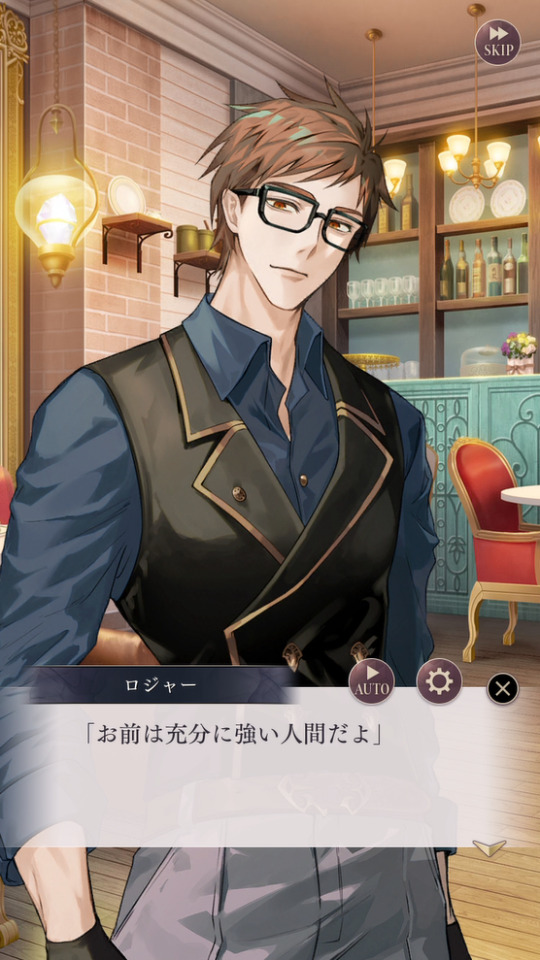
Roger: You’re strong enough.
(What do I do…I’m going to cry)
Roger’s carrot and stick method always disturbed my heart.
If he did this on purpose, then he’s pretty evil.
Roger: Oh it’s here. The roast beef here’s delicious. Here.
The simple look on Roger’s face when he looked at the meat blew my sentiments away.
Kate: Hehe…It really does look delicious…
Roger: … Hey, Kate.
Kate: Yes?
Roger: Being strong doesn’t mean doing things alone. Being able to rely on someone’s also a strength. So you can rely on me.
After saying that, Roger took a huge bite out of the meat.
Roger: Mmm, yum. Come on, it’s getting cold.
Kate: O-okay. Mmm…Wow, it’s really good! It’s so juicy and tender. It’s amazing.
Roger: …o_o Hahaha! You’re as restless as ever. Remember to chew. My family’s corgi used to eat so fast that they’d choke. They look just like you.
Kate: There you go again comparing me to a dog!
Roger: All that barking’s the same too.
Kate: Ugh…
We argued like usual, but my heart felt warmer.
Roger’s words made me feel really happy…and I kept arguing with him so that he wouldn’t notice.
--
Some time later, I joined Jude and Ellis on another mission.
Ellis: Kate, you’ve been moving pretty smoothly.
Kate: Thank you. I’ve been doing strength training.
Jude: Ya still lookin’ pretty soft.
Kate: I-I’m planning on gaining muscle!
Ellis: Good luck, I’ll be cheering you on.
Ellis smiled and put his lips close to my ear.
Kate: Ellis…?
Ellis: Kate, Roger’s going to be in the lounge tonight.
Kate: Huh?
Ellis: You want to report your hard work and get praised, don’t you?
Ellis smiled gently at my surprise.
(I didn’t say that…)
Ellis: Or do you want to go out to dinner?
Kate: I’m heading back. I…have things to do in the castle.
I wonder how Roger will react when I tell him how I did today.
I definitely didn’t want him to know that I was walking a little faster than usual.
63 notes
·
View notes
Note
Hi Panther,
Wow Tranformers went fast. May I please ask for Star Wars Yandere Headcannons, With Grand-Admiral Thrawn towards child reader. Maybe one one he adopted or took an interest because of some genius intellect or serious artistic talent.
Thanks,
Bookwyrm
I can try. Darling is at least 18 in this but it is implied Thrawn has had you for awhile since I don't do child reader. Hope I get his character right, I watched Lore Videos to try and understand him since I was unfamiliar with him :( If he's totally wrong my bad!
This is also a general view, not any specific series or media. I hope next time If I write his character I am more familiar with him ^^;
Yandere! Platonic! Grand Admiral Thrawn with Adopted! Darling
Pairing: Platonic
Possible Trigger Warnings: Gender-Neutral Darling, Manipulation, Overprotective, He's actually an okay dad (minus the manipulation), Toxic parenting at times, Dubious companionship.

Thrawn is one of the best strategists/tacticians.
He prefers to take a non-lethal approach and would rather just manipulate those around him to get a desired outcome.
Thrawn prefers to plan out entire outcomes, opting for winning wars instead of battles.
He can outplay others with his extreme intellect and planning.
Thrawn is also very patient.
He isn't sadistic like many in the Empire, he actually wants to prevent potential dangers in the galaxy.
He isn't really evil... just has his own goals despite who he works for.
Plus in both canons it's confirmed Thrawn is an exiled Chiss, tossed out by his species.
Despite this he still cares for his people.
When Thrawn first met you he did take you in for one of the traits you mentioned.
Perhaps you are intelligent and capable of planning/tactics.
That or maybe you have a talent for understanding the arts of cultures.
Either way, Thrawn would've taken you in if you showed potential to be taught by him.
I feel Thrawn would've taken an orphan or an abandoned child.
He'd sympathize for you due to being cast aside himself and notice desirable traits in you.
Thrawn most likely took you in because he saw pieces of himself in you.
As a result he felt he could mold you into the successor he feels you deserve to be.
Thrawn wants to try and raise you to look at the bigger picture, to have the genius he does.
The Empire most likely has little issue with him taking you in.
They assume he'll make you loyal to them and be just as promising.
Thrawn prioritizes teaching you what he knows.
He teaches you certain tactics and quizzes you to see if you were listening.
He has you study cultural art to teach you his way of planning.
Thrawn actually seems like he'd be okay as a dad.
However, he is incredibly manipulative.
His teachings are ways he can influence your actions.
You don't know it but Thrawn is making you like him.
All you care about is the fact you have a dad.
Thrawn encourages this by trying to be fatherly, too.
When alone he often coddles you.
He praises you and holds you, attempting to give positive reinforcement.
At first his actions towards you are planned like everything else.
But then Thrawn really starts to see you as his child.
He was truly meant to be your parent... in his eyes.
Thrawn cares for you up until you're a young adult.
Thrawn has raised you to share his skills.
While he plans out attacks and overall strategy/plans, you pipe in to give advice.
By this point he has taught you well.
You're even gaining Imperial ranks of your own.
Even if you're an adult Thrawn still tries to be close with you.
He's happy you're successful, fully molded into what he wants you to be.
Yet he isn't ready to just let you go.
Even if you fight him he is adamant you stay by him to plan.
He makes it seem like things will collapse if he doesn't have you help him as his child.
He even tries to hug you like he did when you were young, despite you pushing him away.
Thrawn as a parent would make his child into who he feels they should be, then expect them to stay by his side.
He tries to mean well... but in reality he has used you.
He'd manipulate you even when you're fully grown.
Yet he'd never put you in harm's way.
He loves you as your adoptive father.
Perhaps he should've never gotten attached?
As said before I don't believe he himself would kill.
He tries to use tactics to influence desired outcomes.
If Thrawn feared you'd leave him or wish to change your loyalty...
He has methods of changing that.
You may be his child... but he will not tolerate you leaving him after he took you in.
Most parents expect their child to leave the nest.
Thrawn doesn't want you too.
Especially if you happen to swap sides.
He feels you're stronger with him... loved with him...
So he'll convince you to listen to your father...
Even if it means he has to re-educate you behind a cell.
#yandere star wars#yandere star wars legends#yandere star wars rebels#yandere grand admiral thrawn#platonic yandere
94 notes
·
View notes
Text
Miraculous The Movie Review: An admirable, imperfect attempt
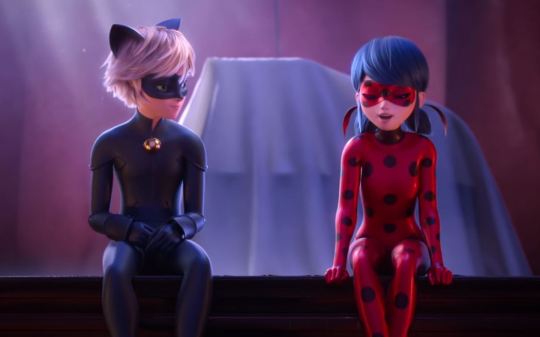
PREMISE
It's not a masterpiece, it's not groundbreaking and it has flaws that limited the result quite a lot, which I'll point out. Yet it's also a very good product that I think should be praised for its efforts.
I watched this movie both with people who have followed the whole series, and with those who have seen it partially. I also watched it by myself and with people who have never seen the series and knew nothing about it.
I have therefore tried to keep my view as unbiased and objective as possible.
I will divide this analysis/review into various sections. I tried to leave comparisons with the series only in the last one, though inevitably, it wasn’t possible to never mention the differences. For this reason, I decided to leave a final vote that will be split into what I grade the movie by itself and what I grade it as part of the Miraculous brand.
However, I want to clarify that with this post I do not intend to discredit those who prefer the show, nor do I intend to encourage those who prefer the movie to behave arrogantly and attack Astruc.
The final part is where I will directly compare movie and show and where I will explain my preferences. You are perfectly free to skip, as it’s the last part before my grades.
With that said, let's get started!
ANIMATION
I've seen little contrast of opinion on this topic. Indeed, it is undeniable that it is of the highest quality. I'm a big fan of 2D, and as for animation I prefer it to 3D by a long mile, but the choice of quality for the movie is impressive. You can’t just help but admire and it surely deserved a worldwide release in theaters.
The backgrounds, the characters, the details, the textures and the focus on expressions… Nowadays, Disney movies spend almost double the budget and offer equal or almost inferior graphic quality.
I also want to clarify that the focus on expressions is very important because by following the "show and don't tell" rule, it allows you to receive information on what the characters are feeling and therefore enriches their profile. You never see a stiff character, even in the background or from a distance there are characters expressing emotions or doing something, which is actually stunning for the eyes. One of the best 3D graphics I’ve seen personally.
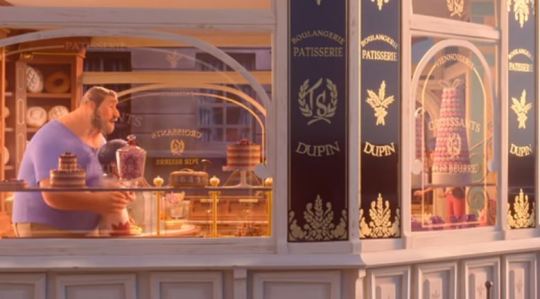
MUSIC
The number of songs is a judgment that can only be subjective, as not everyone likes musicals. But for being a musical indeed, I personally find the number acceptable, especially for the role that the songs played.
I find that composition wise (I study music professionally) they are all very high quality. The harmonies chosen, the orchestration that Zag has composed are of a very high standard not generally seen often in modern animated movies.
This can also be seen in the background music, which is extremely impactful and recognizable. None goes unnoticed, embrace the scenes in harmony. The soundtrack in a movie is fundamental, it enriches the feeling that the scene can evoke. It is after all not an unknown factor that, for example, by removing the soundtrack of a horror movie, you remove much of the effect of fear and unsettlement it creates.
Returning to the songs, however, I particularly appreciated their usefulness for the plot and the characters. I have seen very opposite opinions on this matter, from people praising them and people thinking they were totally unrelated or repetitive. Personally, I think every single song expressed a well-defined concept that carried forward the intended messages.
Speaking from a purely personal point of view, on a melodic and interpretative level my favorite songs were "Courage in me" and "Stronger Together". However, I find the most important to be “If I believed in me”, “Chaos will reign today” and “Alone again”. A song for each of the film's main characters; Marinette, Adrien and Hawkmoth.
And I also found the most well executed “Reaching out���.
But for this analysis, I'm going to touch on each song.
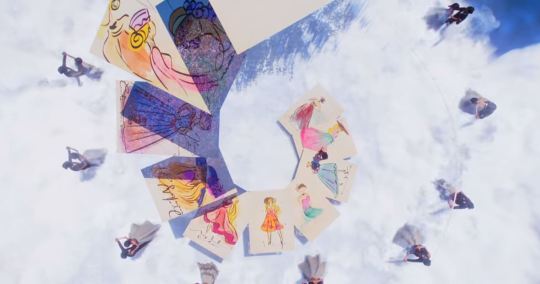
“If I believed in me” This song is the perfect introduction and presentation of the character. It tells us all the key details to know about Marinette at first glance. She is very shy, awkward and introverted to the point of having social anxiety. This has led her to willingly shut people out, even though people who know her a bit more seem to like her, and even if deep down inside she wants to fit in and her creativity is a way for her to channel that. She has a dream as a fashion designer and takes all the inspiration from the world around her. However, this inner conflict leads her to self-sabotage and behave in a bizarre way. This is a classic and basic step that most of the best musical animated movies follow and in this one it was quite appropriate. Putting a song right at the start may seem unsettling for people who dislike musicals or found it unnecessary, however, it was a very right and basic rule to follow.
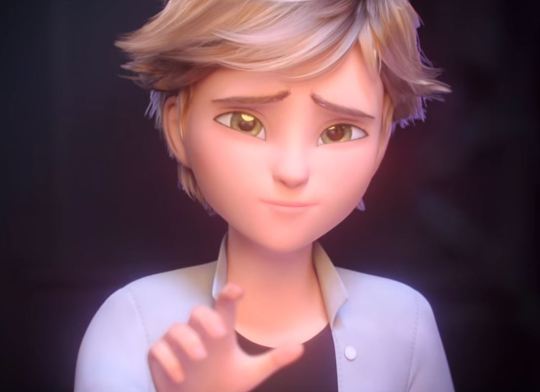
“Alone Again” Another very important song that expresses not only Adrien's pain for the loss of his mother, but also for his father's neglect. The text is universal enough to show that Adrien may want to reconnect with both Emilie and Gabriel. Not having enough minutes in the movie to properly focus on the Agreste family dynamic, this was key to fix that. Because of this, I think that removing it in non-French versions was a very big mistake.
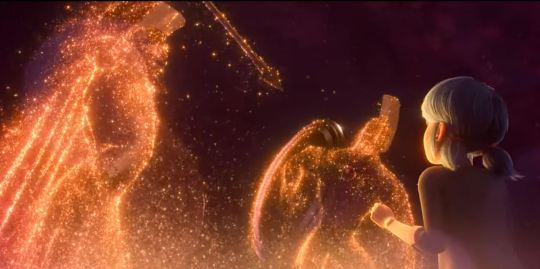
"You are Ladybug" While it’s not one of the most fundamental, it’s a song very well handled, because it not only explains part of the lore, but actually shows that in this movie the Kwami are much more sentient. Tikki demonstrates her knowledge of years of experience. She knows how it works, she knows which carriers are best for her and she also knows it might help Marinette to improve her confidence as she outright states while singing. On a musical level, the use of the show's original opening is also very effective. It's not easy to readapt a motif several times without getting bored of it, even building a new song on top of it, and in this case Zag did an excellent job.
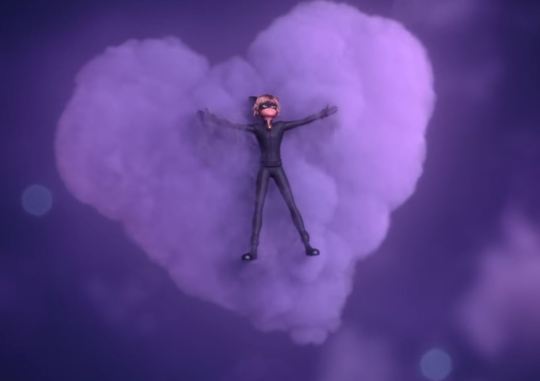
"Ma Lady" Similar to "Alone Again", this song is also very important to show one of the new motivations for Adrien to open up. Chat Noir is Adrien's way of bringing out his inner self, and even though it didn't do it the best way at first because of his attitude, this is the beginning of his change. It’s a crucial song to a crucial improvement.
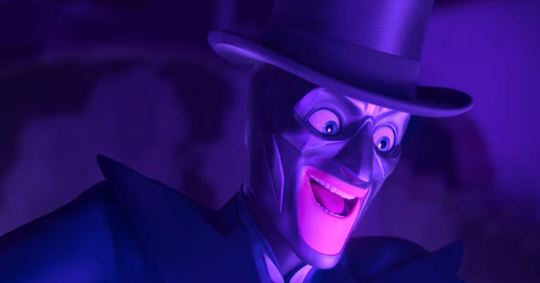
“Chaos will reign today” This song has a strong Disney villain vibe that fits very well with the model they followed for Hawk Moth in this movie. Another classic to express the desire of the villains is to convey it with a song that gives the right tone to the character, who can be more or less evil. In the case of Gabriel it is very smart to show him with a theater man attitude, given that his wife performed in the theater in the world of the movie. It fits well with the character they chose for Gabriel. This song is also the very moment Gabriel is sure about his path and finally decides to go on being a villain.
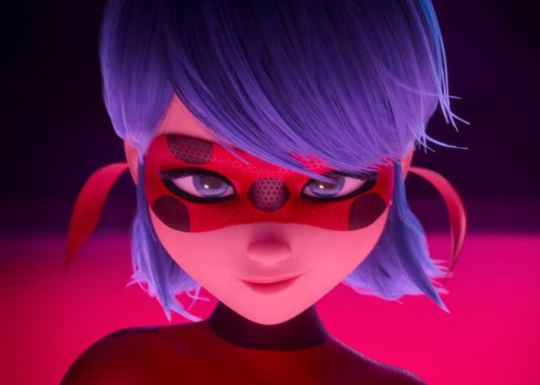
“Courage in me” This song, in addition to having excellent musicality and a change of tone that is always and gradually more triumphant, is very well represented. It begins with Marinette grappling with anxiety and her instincts and desperation growing stronger until they become a call to the mission. Marinette embraces her role after much hesitation and from this moment a change begins for her as well as for Chat in "Ma Lady". From here on Marinette will try to open up slowly and improve.
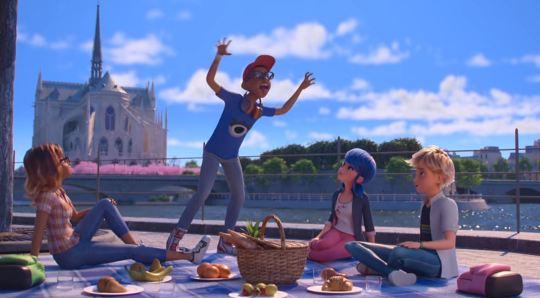
“Miraculous theme remix” Nothing in particular to say about this. It's a pretty good adaptation and perfect for a montage, even if I'll explain later on why I would have substituted it with something else (“The wall between us”).
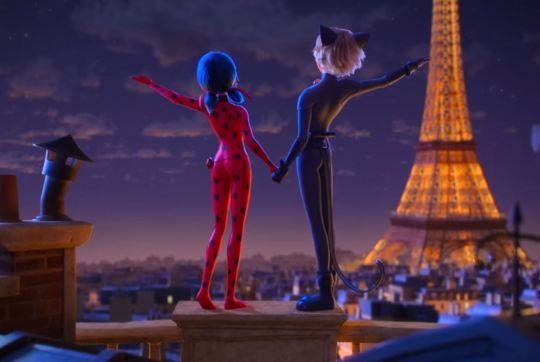
“Stronger together” Perhaps the most representative song of the movie. In addition to the impressive presentation, the portrayal of the relationship of the two protagonists under these forms is enhanced to the max. Both open their hearts, finding the pinnacle of their relationship and communicating it openly. Especially for Chat Noir, this is the quintessential moment where he finally opens up and reaches out to someone. He makes himself vulnerable for the first time in a long while, demonstrating the improvement in him as a person. Sadly, it doesn't end the way he hoped.
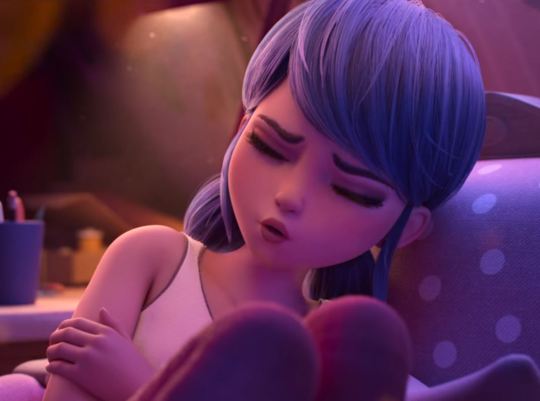
“Reaching out” Perhaps one of the best-performing songs in the movie. Marinette, similar to Chat, has improved and opened up, hoping to be able to find a mutual feeling that however, apparently, wasn’t reciprocated. This moment naturally creates a lot of doubt and insecurity in her and the song represents this difficulty and duality. By now she's grown up, she's learned to be herself and she can't just go back to zero point, however now her doubts and insecurity are growing because her efforts didn’t seem to work.
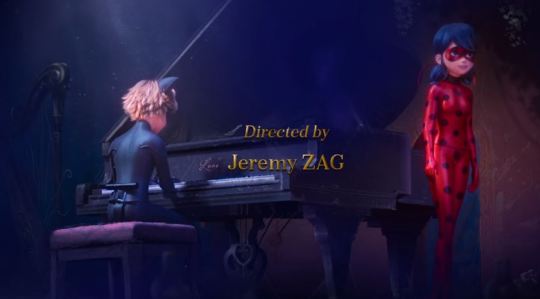
"Now I see" The song played during the end credits. An alternative version to "Stronger Together", with the same main melody, but different words, much more appropriate for the resolution of the movie and the now realized reveal. Their feelings were revealed in totality and they managed to connect. Their eyes and hearts can finally see.
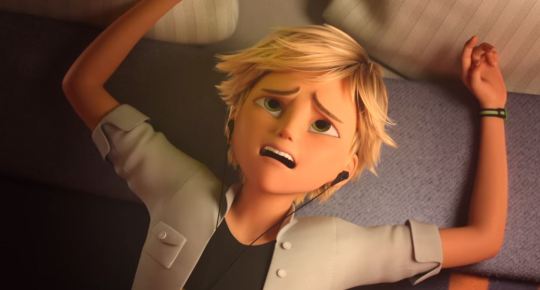
"Careless Whisper" Yes. I will put it in the list because while its purpose is silly, it has one. Putting it in the moment Chat falls for Ladybug makes sense because those feelings are still incomplete and needs to grow and mature. It's understandable to make it a comedic moment. Just like it was a good idea to use it again later on as it's a break up song.
PLOT
Simple but functional plot, which follows a perhaps predictable path but also manages to exploit as much as possible in such a small time frame.
Compared to the series, at least the arc of Hawk Moth, everything is very simplified, but I think it's a good choice.
Not having too complex bases and having to fix everything in a limited time, but also needing to address important themes, the movie was able to focus better on the chosen details.
There are some cuts that unfortunately, however necessary, demonstrate that the movie’s potential would have been better expressed in a trilogy totally focused on Gabriel, rather than with a change of villain, thus allowing for more in-depth development.
However, it is understandable that with the Covid crisis and with the movie's few certainties of success a few years ago, Zag chose a safer path for the first and possible only installment, given the great uncertainty of possible sequels. The only thing that can be blamed then, is the possible fear of daring.
Beyond these elements, the film is certainly well studied in its three acts. Reinterpreting an existing story that spans several seasons and containing it in a movie is not for everyone and I find that as much as possible has been done and that it achieves the goal.
I also appreciated that many aspects of the PV have been restored for this version.
STRUCTURE AND RHYTHM
One of the main flaws of this movie, maybe the most critical, is the pacing.
Given the large number of characters, messages and plot twists, as well as the necessary gradual developments to be made and the relationships to be highlighted, everything happened very quickly and sometimes felt rushed. From the second act, it gallops towards the finale.
At my first viewing in French, this feeling was clear as water, but it improved on subsequent viewings in other languages as well.
It was an aspect I find impossible to prevent, but perhaps could have been lessed in some ways.
This problem goes hand in hand with the impetuous scene changes, even if mostly softened in the Italian version I watched afterwards.
Often there are sharp cuts that can be noticed between one scene and another, given the many perspectives to follow. It is clear that the time frame was limited and this detail would have been significantly improved with just a few more minutes.
In its favor it can be said that despite the short time frame, the many things to say and the too fast pace, the substance is clear. Characters are defined in who they are and what they want. The story is too, touching all the stages and completing itself, but still leaving room for the sequel. All reading levels are readable despite the flaws.
It’s a real shame though, that many aspects had to be rushed where instead they could have hugely benefited with more playing time or even splitting this arc into 3 movies.
DIALOGUES
Another mixed point of this movie are the dialogues. In some moments, for example the beginning with the conversation between Marinette and her mother Sabine, they fall into unnaturalness. They feel a bit out of place.
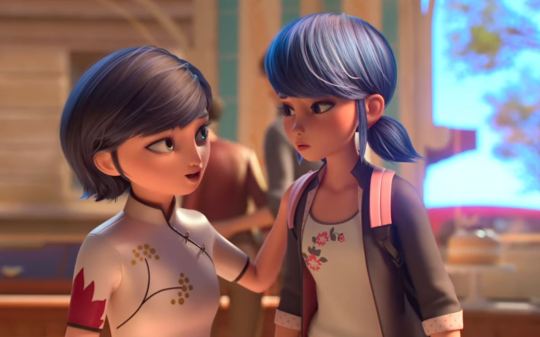
However, there are many other dialogues that are opposite to this; they are well thought out and excellent for explaining messages that cannot always be shown for playing time.
One such example is the dialogues between Tikki and Marinette when they get to know each other. “Exciting! You discovered electricity!”, “Girls can wear pants? Finally!”: these are dialogues that together with Tikki’s sung story not only make us understand the authority of the Kwami but also the historical context of the story and guess the time that has passed since there was enough chaos to call the Miraculous into action.
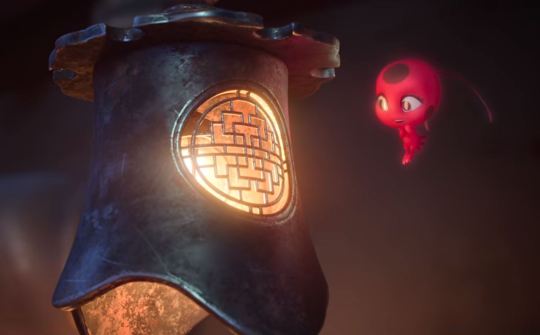
Also much of the characters' banter and comedic gags (with the exception of Plagg farting, which I find unnecessary as that kind of humor nowadays can be considered "outdated" for children and as the movie already had other comic reliefs) help to define the various contexts. Nothing the characters do or say really seems pointless.
DUBBING
On this aspect, I decided not to focus much because for each language there are positive and negative aspects. I have seen the movie in French, English and Italian (my native language) numerous times. In French and English, the known problem is that Marinette's voice is too deep in the singing and I agree that at least in English they should have let Cristina Vee sing. However, even here I don't feel like judging enormously because I also watched the movie in Italian and there these problems are completely absent. Indeed, the Italian version is probably the best in my opinion. Excellent acting and intonation, Marinette's chosen singing voice is very similar to speech as well as impressive in the expressiveness, and Adrien's is the same in both speaking and singing and is intoned and expressive.
The only voice that is out of place in Italian in the singing is Tikki, the same as in speech, a little out of rhythm and intonation.
However, I appreciated the different depth given to the characters compared to the show. Deeper and more expressive.
LORE
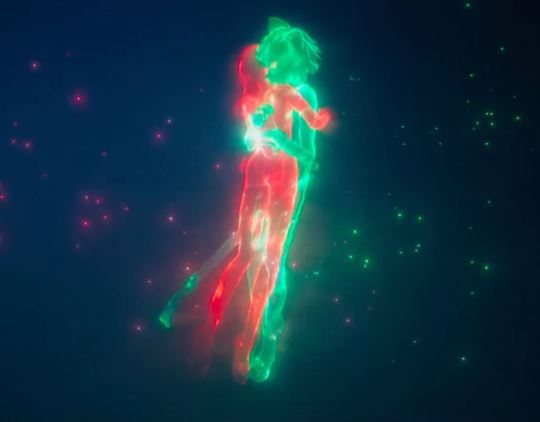
Starting from a purely introductory point of view, we can say that we have had a fairly complete one that immediately informs us of the basics; The miraculous of the cat and the ladybug contain enormous power and are balanced, they are called only in times of chaos and that of the butterfly is the most dangerous in case of incorrect use.
We are then informed in the movie that the Miraculous have been used since ancient times, that the Kwami are related to jewels and bestow powers but that they are also wise and skillful in their choices. They probably go dormiant when use is not needed.
We still don't know how the Miraculous were created, how Fu lost them (if he lost them in this version in the first place) and how much the Kwami have to obey their bearers. Furthermore, perhaps one of the defects is the absence of an explanation on how actually the Miraculous of Ladybug and Chat Noir could help Emilie. Would they bring her back to life? Would there be a sacrifice to be made?
Another aspect that I would have introduced in advance is the explanation of the powers of the Cataclysm and the Cure.
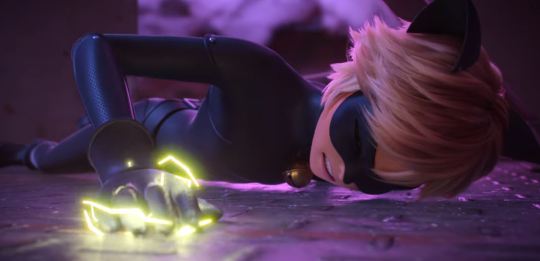
From a usage point of view, I think an excellent job has been done. Great idea to leave them at only the last drastic case, also for a matter of scenic effect. The idea of eliminating all of Ladybug's other powers to truly balance the two heroes is also excellent. Destruction and creation, Ladybug forced only to use her wits with what she has around, without extra help, and Chat engaged in a more physical role.
In this aspect, I think the movie did a better job of never making Ladybug and her Miraculous feel more important than her counterpart ever.
However, as mentioned, the lack of an explanation of these powers and introduction is a shortcoming of the film.
Even a mention of their danger and the fear of using them in any casual fight would have been of great help to better serve the surprise effect. Or propose that you need to reach a certain level of maturity or experience to unlock certain powers, even just inner acceptance.
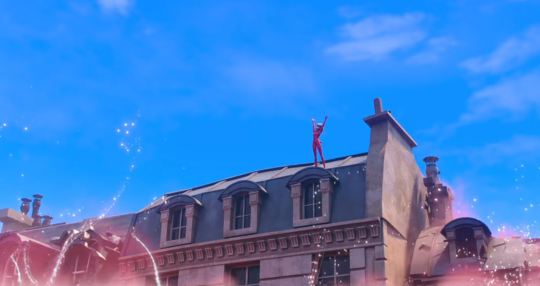
The transformation limits have been removed, as well as that of only one Akuma at a time and a self-akumization of Hawk Moth while he was still transformed. All these changes in my opinion are not harmful and with the time limit it is a more than necessary cut.
It is also implied that the incorrect use of the miraculous can have negative effects on the bearer, as seen by Gabriel, increasingly destroyed and unkempt, as well as victim of fainting episodes. I found it a very ingenious choice, like making the enhancement of the powers of the two main miraculous literal when coordinated.
CHARACTERS
There are characters more or less different from the series, but regardless of whether they are good changes or not, the fact that they exist is not a mistake. It's a reboot, the characters don't have to be the same as their counterparts. They do not have the same roles, priorities or main characteristics. They are not supposed to be anything the show portrays them as.
The most remarkable thing is throughout the duration of the film the two protagonists have balanced roles.
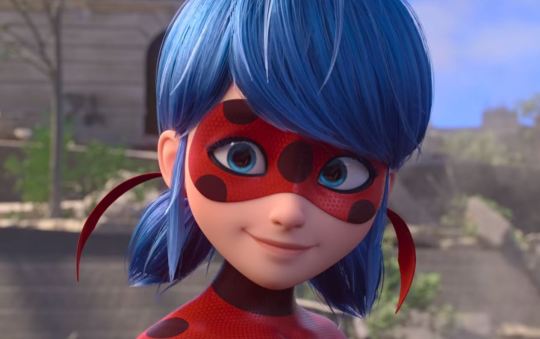
Marinette/Ladybug
In this version, Marinette is a very different character from the series. Introverted and shy, and it is precisely this factor that makes her clumsy and awkward, even going as far as to assume bizarre attitudes in public, withdrawing into herself (as demonstrated with the teens who had tried to greet her and with Alya, whom she advises to stay away) and making mistakes that she apparently wouldn't make with more confidence in herself.
This leads not only others to avoid and mock her, but also to increase her anxiety.
A fairly predictable path for a protagonist where the superhero theme is concerned, but functional and excellent for counterbalancing Chat Noir and his readiness for the role.
From these points of view, Marinette is a character who is a victim of the situation, but also a victim of herself. She is flawed on purpose in the right ways. Her attitudes have a clear cause understood from setting, but realistically it’s still an unhealthy behavior for herself (hiding behind a car on first greeting, risking getting hurt repeatedly, loneliness).
Marinette is "chosen" by Master Fu and Tikki, for her instinctive and rapid heroic gesture, which almost failed. She doesn't hesitate for a moment to risk her life and almost throw it away, there are zero second thoughts. However, Tikki also chooses her because of her experience with past wearers of hers. Indeed, the call to become a hero, a very common theme in the stories of superheroes who are called to service in case they have the opportunity to help, even if perhaps they don’t wish to or never had an option to choose.
It can be said that Marinette is actually "the exception" for a girl of her age. Many would jump at the opportunity to have superpowers, like Adrien.
Indeed, Marinette keeps doubting clearly until "Courage in me", where fear is transformed into the need to act. Marinette has no choice, but she embraces the task and from that moment she begins to change.
She will begin to open up more to Chat's company, she will begin to open up to her friends and Adrien, to communicate with him, to get to know him.
And we see her blossoming into the same but also a new person, which leads her to a better life. However, the message given isn't that you have to change yourself to be accepted. But that effort must start from you. If you harm yourself and wait for others to step forward (even if the help of others is useful, as demonstrated in the movie) you will not be able to get back on your feet.
Marinette finds the confidence not to change herself, but to BE herself. To open up, to try courageously and relax, arriving at beneficial results for herself and this consequently leads to acceptance by others.
Marinette is already a fantastic person, but she has to let others see it and her experience as Ladybug, then leading to opening up first with Chat, with Alya and then with Nino and Adrien allows her to reflect what she has inside.
After rejecting Chat Noir with regret and inner doubts and after the rejection by Adrien, Marinette doubts again. After all, she made the effort, she got better… and it wasn't enough.
She doesn't know if it was worth it or not... yet she proves that the Marinette she once was is now different. She rushes into action to help when Hawk Moth strikes and after a moment of crisis she remembers the words from Chat and Tikki, during the very moment she hits rock bottom. She gets up in the form she believed most vulnerable, which she had already exposed once failing, she throws herself forwards and saves Chat Noir.
And finally, with the herself that she built, she rebuilds the city and steps forward to connect to Chat/Adrien. Difficult step because there will always be the slightest doubt of being rejected, but she embraces it and this time it brings her to a happy ending.
She no longer has to worry about having her parents drive her to school, she no longer has to worry about being watched, because now she can let her inner light shine and she knows that if she falls, she will rise again.

Adrien/Chat Noir
In this version the male protagonist is much more introverted as a civilian. Similarly to Marinette, he too has difficulty opening up and from a certain point of view he too by personal choice. Also demonstrated by the symbolism of the earbuds that he always wears in moments of insecurity. Indeed, in his case it is mainly a self-isolation that is imposed due to the trauma suffered by the death of the mother and the distancing that the father has placed in the relationship with his son.
Unlike the Adrien of the show, this Adrien grew up without particular restrictions, he can go where he wants and also had a good relationship with his father, who was present and affectionate. It's not hard to think that in this version Adrien was even encouraged by his father to go to school as a way to push him away, given Gabriel's confirmation in the finale that he couldn't bring himself to see his son's sad gaze.
As a consequence of this, we see an Adrien who, while kind and helpful, is not the same ray of sunshine of the show, whose main trait is kindness. But in this case, it doesn't HAVE to be.
This Adrien has trouble opening up and is afraid of becoming attached, which is why despite going along with Nino proposals of hanging out and helping out Marinette, he doesn't feel like being around them too much.
On the other hand, as Chat Noir, he is extremely stuck up and arrogant, proving that Chat is really an escape for the boy, who however exaggerates in letting this side out and ends up behaving in a quite negative way (albeit in moderation). A guy who probably really took on a few traits of the snotty rich kid.
This reading shows us a clearly flawed Chat Noir.
We don't see his meeting with Plagg or transformation, but from the get-go Chat is the one willing to wear the role, so while it would have been nice to see it, I don’t blame the cut. It was Marinette the one that needed more focus in this case.
Chat's attitude changes from the moment the boy develops a crush on Ladybug. This drives him to improve and gradually moderate his attitudes. Unlike the show's Chat he doesn't flirt and while it’s gradual, his banter with Ladybug becomes more playful and affectionate in nature and starts trusting her capacities. He becomes more humble and approachable, admitting that he doesn't see himself as the boss of the duo and offering to play sidekick. He collaborates with the girl during the fights, listens to her, begins to see her merits... and in civilian life he begins to go out with Nino, Alya and Marinette, to the point of opening up about his mother with the latter, an extremely personal topic for him. He no longer wears earbuds, no longer isolates himself from the outside world.
We see him again in class finally, when he didn't show up at the other lessons and we see him go back to a normal life.
His feelings for Ladybug in this case have improved him and come to a head when he also confides in Ladybug about his mother in his special place, confessing his feelings in a song and showing his vulnerability. Unfortunately, it does not end up as he would like and it leads him in the same situation Marinette will be into shortly after, doubting how good it was opening up. At the proposal to go to the gala with his friend, he will reject her with regret and what appears to be repentance and guilt.
This passage can be read both as insecurity about his feelings towards Marinette, and as insecurity about him opening up to others, given the hard blow immediately after finally opening up for the first time.
But even Adrien can't go back to zero point, and after a momentary moment of grudge, once he realizes that Ladybug is in danger, he runs to help.
Adrien throws himself into the fight against his father, which lands him in trouble. Thanks to his father's guilt, the villain stops and the two talk. Here Adrien's growth finally shines, who finally incites his father to let Emilie go, which he too had to learn to do and did, and forgives him.
That is a moment of acceptance and unfortunately, however, it is also a probable farewell, with the father who has presumably ended up in prison. Adrien thus remains alone and returns to isolate himself again due to the new trauma, even if not completely (he went to the dance, he doesn’t wear earbuds and Nino says he will join them). It's hard for him to go back to normal and heal, but he's learned and the step Marinette takes to reach his heart finally pays off and Adrien can start healing.
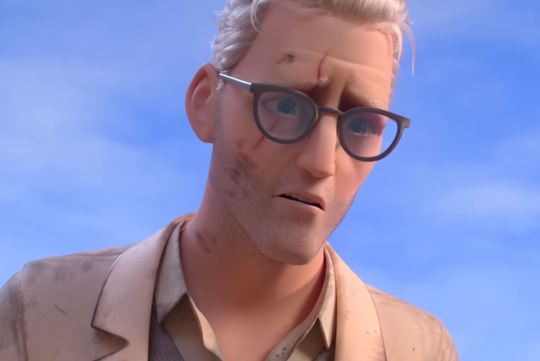
Gabriel/Hawk Moth
Perhaps the most human character in the movie. Gabriel, contrary to the show, is a man who shows constant crisis towards the loss of his wife. In the presence of others he proves to be composed, engaged in his working life (which we finally see more of), but in the private sphere he does not hesitate to show us all his desperation, also visible in his appearance which becomes increasingly scruffy as he continues with his hunt for the Miraculous.
We arrive at the end of the fight that he is a man destroyed by pain, by his own obsession that has taken over and by repentance.
As a character, although he comes across as cold and distant, he doesn't seem to abuse his son. Rather than an abusive parent, he is very neglectful and he pushes Adrien away for a matter of grief, not for his own standards of the family. He doesn't harshly reject Nathalie's proposal to eat with Adrien because he really doesn’t find it necessary, rather the reminder seems to hurt him because he knows he is wrong to not want his son around, which is why he acts so stern right after.
Thanks to the song and the revelation of his role, we discover that he is slowly descending further and further into madness, overwhelmed by his feelings. His own song, while not excusing his actions, treats him almost sympathetically and is the very moment he made the choice for his path. Up until then he was unsure which way to go, but the more his desperation and impatience grew, the more he lost control. And as Adrien freed himself from the chains of mourning, Gabriel became more and more engulfed in them.
Gabriel shows us that he cares about his son, while trying to detach himself emotionally to the point of believing he no longer has "Nothing to lose". To the point of believing that their relationship cannot be saved and that really the only way is to return Emilie to Adrien, even if that could mean losing his son's affection.
Still, Gabriel worries about his son's health and safety at all times, between making sure he's not at the scene of his attacks and wondering where he's been during the night. All this, while we see him more and more unkempt.
Gabriel, however, has been a loving man in the past and has all the bases for a possible redemption. It is precisely so that when he recognizes his son in Chat he decides to stop, realizing how far he has gone.
It doesn't excuse him from his actions, for which he will likely pay, but it does make him a villain we can sympathize with. He finally lets go of his wife, accepts the pain, and receives acceptance from his son who acknowledges that Gabriel too needed help. And then he hugs Adrien for the last time, in what seems like a desperate gesture that he's wanted to do for a long time. Heal the wounds of loss with the love of the one he still had, but who probably couldn't raise anymore.
However, a negative detail of Hawk Moth, perhaps the only one, is the fact that his costume does not fit with the character. In the series, his mask is understandable because at the beginning you don't want to immediately reveal his identity. However, this element is not introduced in the movie, so a redesign would have been appropriate.
For the post-credits scene, it is very unlikely that Gabriel left to Nathalie the duty of carrying on the plan, especially AFTER he surrendered, evidenced by the dialogue she recalls, implying that at the time of the confession no one else knew of his identity. After his surrender, all Paris was aware and it would have made no sense to talk about it as if it were a secret (although Emilie's body still was). Nor would the authorities let Gabriel loose after his surrender.
The kwamis
In this version we generally know little about the origins of the Kwamis as we do in the show. However we are aware of how much more sentient they are. Their authority is significantly greater and they are more difficult to manage. Theirs is not an attitude of chaotic innocence, but rather a "We do as we want because we have the right to", because they have enough years and experience behind them to be able to decide for themselves.
They impose themselves on their bearers and although they act as advisors, especially Tikki, they do not hesitate to reiterate several times that they are very expert beings in their job, to the point that they know how to recognize a pattern in all their bearers and also use it for choosing them. They are Gods, and as Zag wanted, they manage to prove it despite their cuteness.
We also know that Tikki and Plagg don't get along very well, but having not seen them interact we cannot yet define their relationship. Let's hope that in the sequel we’ll see this element, given the new relationship of their carriers.
Tikki is much more in-depth than Plagg in terms of screentime. Often advising Marinette to follow her feelings but also advising against it if needed, always following her own experience and gut.
Plagg on the other hand, unfortunately has much less screentime and another weak point of the movie is the fact that he was into the comic relief, in a somewhat avoidable way. Too bad, because despite his tough exterior he hides a soft heart, as demonstrated when he consoles Adrien over Ladybug's rejection.
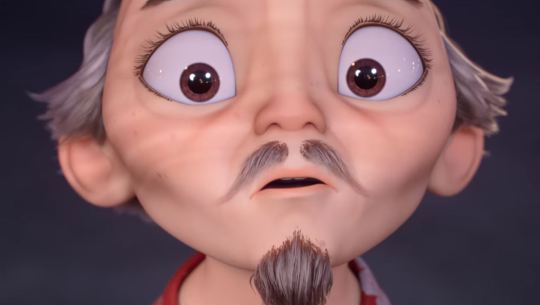
Master Fu
Master Fu in this version appears more like a real guardian than a mentor. A person who looks at the Kwamis and makes sure they don't take too many liberties and then takes care of choosing new bearers together with their approval.
He does not approach the two heroes to instruct them except at the beginning, approaching both of them and at the end to recover the miraculous of the butterfly.
More than his absence as a master, the lack of his backstory and the missing miraculous can be seen as a flaw, although it is possible that it will be addressed as a theme in the sequels.
Fu in the movie is much weirder, ending up taking on a secondary comic relief role which in my opinion would have worked a lot more in this case, rather than on Plagg.
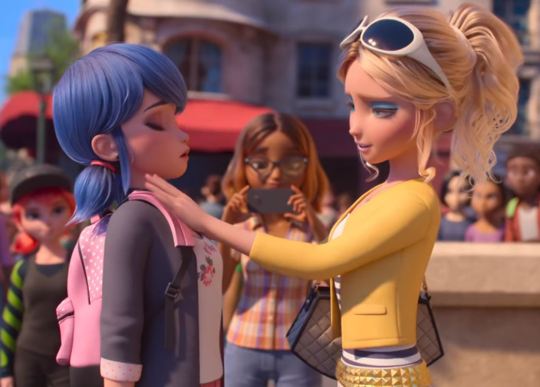
Secondary characters
Given the short time, many of them could not receive much space, but they were still able to show their usefulness.
First, Alya. The girl has a very charismatic personality and this leads her to approach Marinette and be the perfect person to match the girl, given the social problems she has and her tendency to push others away. This is one of the elements that helps Marinette open up, leading her from being drawn into a friendship to making friends of her own free will. Very important is that we are told early on about her dream of being a reporter and that it is used to motivate her attitude, which is never explicitly said on the show, even though it is part of her character.
Another character that I would like to mention is Chloé. The girl, contrary to the show, falls more into the kind of bully that cares about their reputation. She doesn't want to be seen doing bad things to Marinette, as shown more than once, especially in the scene where Alya purposely starts filming her to make her stop. She is bratty and bad-mannered, yet her refusal to be caught mistreating others is a sign that she recognizes her actions as wrong, which is a huge differentiator from the show. While it doesn't excuse her, this sets the stage for possible redemption in the sequels.
I also find the use of Nino and Marinette's parents positive, who are an excellent side element and help the characters move through the plot and in their development.
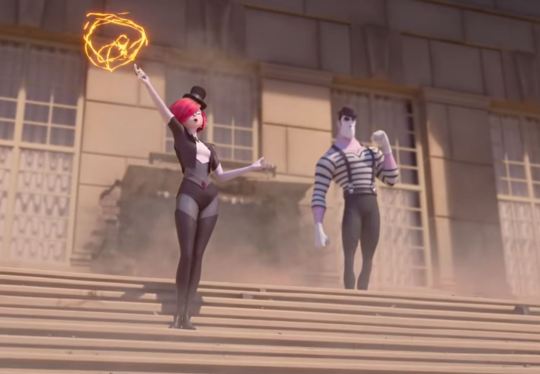
The akumatized
For a short movie, the handling of the akumatized people was excellent. The first showed us how transformation and its lore works in this universe, also showing us that a negative feeling is not just simple anger and sadness, but even intentions alone count.
The first clash serves us as an introduction and unleashes the story from every point of view, both for the roles and relationship of the protagonists, and for Gabriel's journey and the reaction of civilians. Each clash changes things and a notable contribution is made by the second. The two heroes learn to work together and are finally seen in a positive light by the still hesitant civilians.
The second clash also shows us action scenes during which Chat Noir and Ladybug strengthen their relationship, their powers and show the basis of their individual qualities, or the physical clash for one and creativity for the other.
Then we have a montage of villains, which saves minutes and despite everything allows the collaboration of the two heroes and the opinion of civilians to flourish.
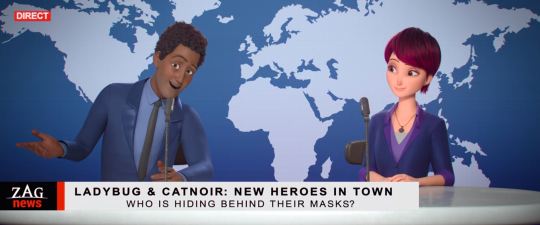
The background characters/Civilians
Another element already mentioned are civilians. As I already talked about in the animation section, one notable aspect is how no character is standing still and everyone has their own reaction. I really appreciated the naturalness with which we see them trying to control the anxiety on a roller coaster, despair despite the worst was over after the final showdown and the slow acceptance towards the new heroes.
An aspect often overlooked in the series is the perception of civilians towards the heroes, almost completely enthusiastic right from the start if not for the competent authorities.
In the movie, we see them hesitant and intrigued, slowly in the process of opening up and trusting the two vigilantes, always not completely sure, given their mysteriousness. Contrary to the series, the two heroes seem much more unreachable at the beginning and it is visible and understandable that the inhabitants of Paris do not know whether to trust two strangers that hold powers as strange as those who started to haunt them.
RELATIONSHIPS
One of the obviously most important sides to analyze is the relationship aspect, especially the main couple… (as I already talked a lot already about Gabriel and Adrien’s relationship in the characters analysis, I will focus more on the romantic aspect in this section)
From a lovesquare point of view, it can be said that this movie has a total absence of Ladrien and almost total absence of Marichat, leaving room for a parallel path with the Adrienette and the Ladynoir. However, it is also clearly visible that the movie's main couple is Ladynoir.
Starting back…
Marinette and Adrien in this reboot are two characters both very introverted in civilian life, opposite to the show. The two have a similar problem of mostly self-imposed isolation, which is broken when wearing the mask, which seems to improve them and allow them to let go more of their inner self. From this point of view, the lack of the Adrienette seems less problematic, as their deepest parts come to the surface with the masks and they are shown to fall in love with them.
However, it remains a pity the little playing time given to the development of Adrien's feelings towards Marinette.
While it is made clear that Marinette is undecided between Chat Noir and Adrien, on the other hand, Adrien's indecision between Ladybug and Marinette is very hidden.
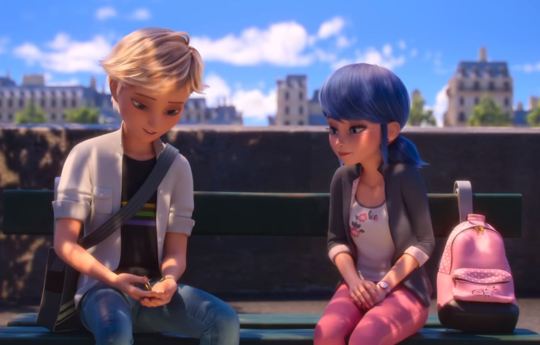
It is not totally absent of course, we can clearly see the regret mixed with guilt and frustration when he is forced to refuse Marinette's invitation to the gala. He seems mortified, at the verge of tears. And you can see it also in the happiness and simplicity with which he accepts Marinette after she reveals herself, as if it made perfect sense and reassured him.
We also see him open up to the girl about his mother, which is extremely personal, and we see him support her in the montage. All of this would have been better exalted if spoken dialogue had been kept in the definitive version (for example, in the book version of the movie Adrien loses his locket and Marinette helps search and finds it), or, if there had been the inclusion of "The wall between us" .
Unfortunately, this is one of the points on which I have to dwell in a negative way. The removal of this song was probably the movie's biggest mistake. Just replacing the remix theme song with this song, which accompanies the scenes and shows us Adrien's conflicting feelings, would have greatly improved the situation.
Like all the other songs in the movie, which have a very specific purpose, "The wall between us" also had one, perhaps one of the most important ones that would have balanced "Stronger Together". They are songs to pair, not replace on with each other, and the removal of one has affected the entire movie.
I want to say again that I don't think there is a total absence of Adrien's feelings towards Marinette, underneath, and that the damage doesn't mar the movie enormously, but it is still one of the major flaws, which could easily have been fixed with an extra song or a simple replacement.
I also found out that in the book version of the movie Adrien was indeed showing thoughts of being conflicted between Marinette and Ladybug and before the ball he retrieved the papillon she made for him, besides refusing to dance with Chloé because he only wanted to dance with Marinette.
Sooo yeah, I wonder if the timespan of the movie was really such a big issue, as they cut something important that they still had pretty much figured out.
Speaking on the other hand from the point of view of analyzing the feelings themselves, let’s first focus on Marinette.
Marinette's feelings for Adrien blossom when he helps her up and worries about her, which has never happened to her before. Sure, Alya had rescued her and was her first friend, but it was a different attitude. Adrien worried about her several times and patiently helped her and that gesture, for her who was always teased or ignored, was fundamental. Her slow realization and her desire to get to know him better slowly pushed her to solidify that feeling and to be able to develop their friendship, although this element unfortunately had little space.
The depiction of Marinette's feelings was excellent despite everything, starting from a gradual shy crush, growing towards friendship and then becoming a conflict with the feeling directed towards two different boys.
As for Adrien's feelings, as already mentioned, we're sadly pretty short on the Adrienette front from his perspective. However, we can still note that although he finds Marinette "strange" for her behavior, he does not make fun of her in her face or behind her back with other people. He is not saying it with ill intentions, it’s just a very true observation. He helps her gently and slowly opens up, supporting her in her needs and allowing her to support him back.
On the Chat Noir front, again as already mentioned, we can clearly see that his feelings for Ladybug were born as a crush, almost comically, just when the girl saved him. Initially, his feelings are quite confused, guided by the idea he has of her. However, already from the second mission, their attitude towards each other changes and Chat begins to discover the most creative sides of the partner. The boy is aware of Ladybug's fears, because she herself tells him about it and we can see in the timeskip that they have fought together for a long time and have also dedicated time simply to get to know each other. He knows she is scared but she is still trying and his feelings grow. Ladybug too clearly starts falling for him.
We can say the partnership of the two heroes in this version is very interesting, because it doesn't start in a positive way at all. The two argue, as their Kwamis apparently do. They are really in conflict, because they are opposites. However, their bickering slowly turns thanks to the acceptance into affectionate banter and retort, no offense.
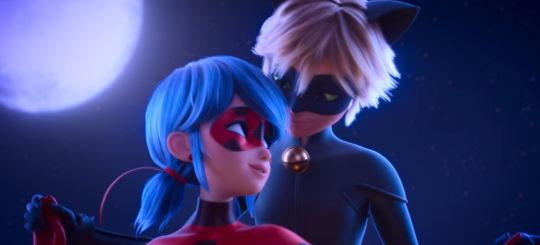
Their partnership throughout the film demonstrates the need for a balance, between a Chat expert in physical combat that shows him easily beating Ladybug, and a more creative and flexible Ladybug in exchanging strategy.
We see them engaged in fighting schemes, in coordination, to the point where it is no longer just a saying "stronger together" but a real rule. Their miraculous actually strengthen when they are in sync, like the Ying and Yang, two figures that complement each other.
And the sidekick figure that switches from Ladybug to Chat, then disappears. Their simple partnership, their collaboration and support in an unknown situation, leads them to improve their character from every point of view, to the point of reflecting on their lives as civilians.
For the timeframe available, an excellent job has been done on these aspects.
The only flaw remains Adrien's conflict and the consequent lack of "The Wall Between Us".
It was also excellent how the natural conflict was moved to Ladynoir and all the relationships were treated in a very natural and realistic way. Adrien and Marinette’s initial conflict in the series lasted very short and was quite forced, while Ladynoir has all the reasons to have it for how their personalities were presented and for their roles. Them growing in their civilians and heroic parts was done very beautifully.
Speaking less of objectivity and more of personal taste, I would have liked them to use the Marichat route more than the parallel love of Adrinette and Ladynoir, always insertable.
Furthermore, I would have appreciated that the reveal came more for the fulfillment of the heart and less for events that forced it. That is, that falling in love led the heart to understand that the two loved ones were the same person.
However, these elements are pure personal taste, and I don't find their absence a real fault of the movie.
Another element that I greatly appreciated is the fact that we saw a montage of Alya, Nino, Marinette and Adrien coming out as friends and forming a tight group.
It is a very important detail for the development of the characters.
COMPARISON TO THE SERIES
*CRACKS KNUCKLES*
Ok, as said at the beginning of this post, you are free to skip this part. If you decide to read it, know that I don't expect you to agree with me or that I’m not judging who didn't like the movie and who loves the series more.
This is just my personal opinion and I apologize if at times it can come across as quite intense. That is totally not my intention!
It is no surprise that I liked the movie and that I enjoyed it more than the series.
I am aware that one is a movie, with limited time, and one is a series. And I am also aware that they are products written in different conditions.
However, with one being the original source, I feel it is impossible to avoid a comparison.
One thing I'd also like to point out is that it's not about what I like best as a trope. Because if that were the case, I wouldn't have liked the movie at all; Marichat is my favorite ship as a concept and I think it's the best development for the story, and as you well know it's totally absent from the movie and with the reveal already done there can't be any pre-reveal development in the sequel.
I also like the idea that they realize their identities with their hearts after they meet.
The show has tropes that I might like, some even more than the movie. However, it was the way things were handled that led me to the conclusion that the movie did a better job in the writing.
It's a common thing I've heard in the fandom that the movie in an hour and a half has done more than the series in 5 seasons.
And well, I think that's true, although I also think it's crucial to explain why and what was done better.
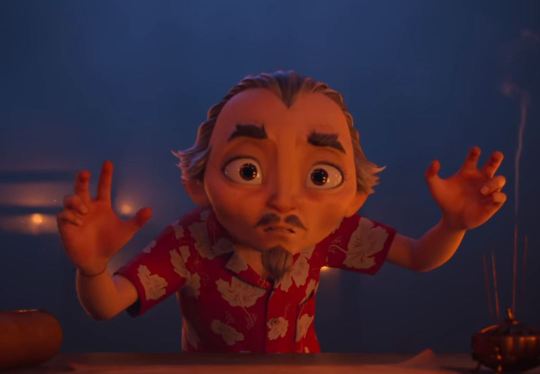
First of all…
I don't think a more confident Marinette is a problem. What I think has been the mistake in the way she's been handled on the show is to have her act so… extreme. Her weird behavior is a manageable element, but it's one thing to be weird cute that can embarrass you, it's another to make it so over the top that it becomes all of her character, especially while implying that those attitudes are a normal thing. Especially if when she makes a mistake she either doesn’t pay for it, or she does but goes back to stage 0 from the following episode. Or even if it’s portrayed as nothing is wrong at all.
I don't think it's a good move to have her act like this for 4 out of 5 seasons of the first arc, rendering her unable to hold a conversation with Adrien and form a natural friendship with him BEFORE entering a relationship with him.
We barely saw the group of friends (Alya, Nino, Mari and Adrien) hang out, perhaps justifiable by Gabriel’s choice to keep Adrien locked up. But there was never an attempt to get around it and still allow the characters to interact for an adequate period of time except in very rare cases that lasted very little, when the series had all the time to do it.
Most of Adrien and Marinette's conversations were cut short and we can count on our fingers how many times the two had a heart-to-heart before getting together. It got to the point that Marinette admitted that she didn't know Adrien at all at the beginning of the fifth season and not recognizing Chat in Adrien in the fourth, which is very grave.
The movie, with its limited time frame, not only managed, albeit largely in a montage, to show us the group of friends that was forming, but also showed how Marinette attempted to get closer to her crush, to get to know him, and have formed a real bond of friendship!
I don't think adding trauma last minute in season 5 to explain Marinette's behavior fixes that. It doesn't work, as she's never had those problems in alternate realities or with other guys she had crushes on and her attitude has never been portrayed as a bad thing.
I much prefer the movie's approach to her feelings and her character, because from the beginning we know that she has problems, we know that what she does is not healthy for herself, but it gets better with time.
Just as I appreciate, as already mentioned, the removal of the initial conflict between Adrien and Marinette, as it was one-sided and basically short-lived. I think the intention of the series was to show that Marinette didn't fall in love at first sight with a pretty face or the boy's fame. However, for 4 seasons it never came out why Marinette liked Adrien, nor were those feelings deepened by the characters as they got to know each other more and more. Marinette has portrayed Adrien as the perfect boyfriend material for a long time in the series, which contradicts the purpose of their initial conflict.
Same goes for Show!Adrien, that barely shows his personal interests and thoughts that aren't Ladybug related (first) or Marinette (later).
The conflict in the movie however was given to Ladynoir, which makes a lot of sense as they are opposites anyway who have to learn to work together. It also brings a whole new development to their relationship which I appreciate.
Chat Noir and Ladybug are treated as equals in a way the series never has. Their powers are balanced, so are their roles in the story, screentime and in combat. Their relationship is never “subordinate and leader” and we watched them explore this aspect until they came to the conclusion that they were equal partners. Even Fu approaches them together Tikki calls them "guardians".
The series dealt with the topic by always leaving Chat Noir in the dark and creating an entire subplot that was never resolved and just showed us a still insistent Chat Noir and a Ladybug who treated her partner badly, with no guilt on the way and with no final apology.
Using misunderstanding tropes is good if you can handle them.
If we are to believe that Chat and Ladybug are partners, that the characters are equal in roles and relationships, it is not only necessary to say it, but to prove it.
And surely the season 5 finale didn't help in that aspect…
I have delved into these topics in other analyzes that I have done. You can find the analysis of the Ladynoir subplot here.
While here you can find the analysis of the season 5 finale.
Characters with flaws are important, but these aspects must be addressed as such and corrected in an adequate amount of time.
While not as much as Marinette towards Adrien, Chat has also been too insistent on his feelings for too long and I appreciate that with his character change in the movie, we had a natural conflict that turned into respect later on.
Just like I appreciate that their relationship improves in the long run and gives them the courage to improve themselves.
As for the change of personalities itself, I think it's pretty subjective here. It's not wrong to choose a more open Marinette and the same goes for a sunny and innocent Adrien.
These are different interpretations of the characters. I just think with what it has at hand, the movie has managed its version with more skill.
I also much prefer the approach to the character of Gabriel, because while I like the abusive parent road to the core more, I also think it's something to be treated with a lot of care, which is not the case in the show. Gabriel in the movie is a very human character, who, although in conflict, never contradicts himself, unlike Gabriel in the show.
One thing I immediately explained about the movie is that the pacing is poorly managed. True, this is a big flaw. But it's also understandable given the playing time available and the amount of information and relationships they had to readjust.
The series has terrible pacing too. And it has had plenty of time to deal with its elements and most of the changes have occurred in the last season of the first arc, with more elements being dragged further and further and most of which have not been resolved.
It's even missing a lot of lore, when there was so much time to put it in! Even to delve into it in detail.
Or the management of the secondary characters, rightly cut a lot in the movie with limited playing time, but completely incorrect in the series which has every opportunity to make them stand out.
Marinette's falling in love with Chat lasted for a few episodes where she was constantly being told that she was just projecting her crush on Adrien. Adrien falling for Marinette only happened in the last season and that becoming again all he thinks about.
There isn't enough attention to the characters' passions, their lifestyles and they often don't react naturally to things that happen to them. They don't ask themselves out loud things they would naturally think in their situation. The characters don't get to know each other, they don't spend time together normally even just like anime would in their fillers.
This is something we lack in both what they say and what they do.
I would also like to mention that it doesn't matter how many seasons they add. The fact remains that we have had 5 seasons already badly managed. You can add as many seasons as you like afterwards, but you can't fix the issues you've had over 100 episodes with them.
The path is as important, if not more important than the final goal.
In the movie, however, we saw the characters open up about personal issues that they could reveal without worry, even with the masks. We've seen the characters spend time together, have natural conflicts due to their personalities and conditions then resolve still in a natural way. We have always seen a sometimes comical but realistic representation of the feelings of the characters.
What was cut and simplified, allowed for better management of what they had in their hands. That these elements correspond to the vision of many fans is no surprise because Miraculous in its structure is a very predictable series. A series that can have thousands of different developments, but all of which can be foreseen in a certain sense, at least the basic ones.
This however is not a bad thing. The use of clichés or predictable structure is not wrong if well managed. It is much better than the constant pretense of unpredictability which however leads to the distortion of the entire product, making it unnatural and giving unclear or negative messages.
If the movie was just fanservice, we would have had Marichat, the fan-favorite ship.
We would have had the most thorough Adrienette.
In the time available, the movie has proposed a development of relationships and characters that are not perfect, they are flawed but healthier.
We had a semi-conclusion which, however, leaves room for further development into the sequels, for example for the post-reveal relationship of the protagonists.
One never expects the perfect relationship, or the perfect character, but something coherent in its construction and treated for what it is and not pretending it managed something it never really had done.
The movie managed to make the heroes lose but also to make them win, to make love win, which was the message of the film.
Whether it's a non-abusive Gabriel who ends up face to face with his son, whether it's a Chloé with a chance of redemption, whether it's a reveal… all these elements have also been set up in a different way.
Chloé does not go beyond certain limits, the characters got to know each other enough to instantly accept each other at the reveal and react with extreme joy to the point of crying, Gabriel has always shown that he loves his son…
Choosing that Chloé doesn't redeem itself is fine, but it's how it was introduced, managed and set up that is wrong. Gabriel remaining bad through and until the end is fine, as long as the purpose of the villain fathering the male protagonist holds a sense writing wise, confrontations are allowed and no wrong messages are passed across.
Choosing to set character crushes as unhealthy in the beginning is fine, as long as getting to know each other leads them to develop those feelings in a more positive way.
Adding love rivals is fine, if they’re properly handled and they have a purpose that leads the character to learn something and then to a better endgame.
Adding new villains is okay too if they’re realistic enough to not go outside the suspension of disbelief and they are slowly and constantly built up. Adding conflict and angst is fine, as long as it's natural, leads to an equally good resolution, and has a purpose.
A movie with so many limitations and with its visible flaws, has succeeded in an impressive feat and served up a great product.
Yes, it would have been better if it was the start of a trilogy for the first arc as a whole. It would have been better if it hadn't cut “The Wall Between Us”. It would have been better with a slower pace. It would have been better without the fart jokes!
This movie had the potential to do even more, to be something spectacular.
It did not make it.
But it still managed to be a great movie.
The movie has accomplished a lot in a sea of restrictions.
The series has accomplished very little in a sea of opportunities.
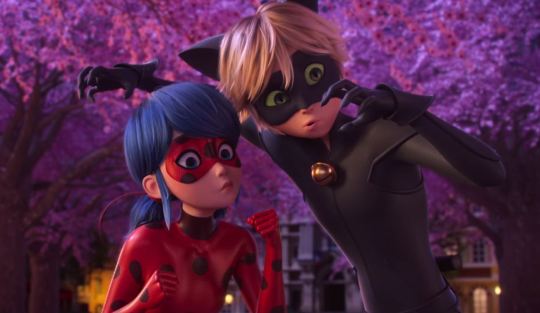
FINAL VOTE
Movie as a product by itself: 8- / 10
Great messages, great developments and comedy often well managed. High level animations and music. Extremely poor pace management.
Movie as a product of Miraculous: 9.5 / 10
Clearly more successful than the series, although it has strong limitations due to the vast content and the limited playing time. Aspects much better managed from every point of view. The only flaw is the Adrienette content they cut out or the lack of "The wall Between Us"
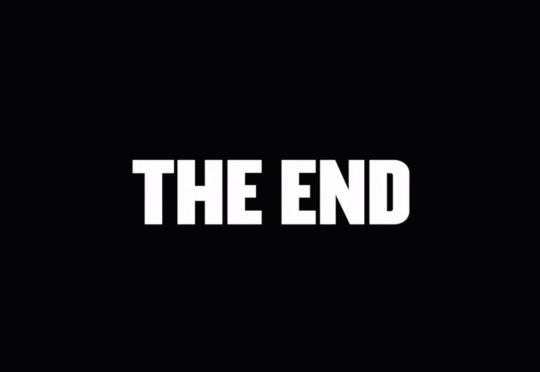
51 notes
·
View notes
Text
Ash Ketchum Becomes Reigning Champion During World Coronation Series

Above: Ash Ketchum holding the World Coronation Series trophy after defeating Galar's champion Leon in the finals of the Master Class.
By: Admin | 31.12.2023 | 1.5k words
Introduction
Finally, young Ash Ketchum has reached the top during the recent World Coronation Series after his several years of defeats from the many Pokémon Leagues he participated in.
Ketchum has not only participated in seven Leagues aside from the Coronation Series, but also actively contributed to the formation and organisation of the Alolan League (of which he fought in and became Champion). Ketchum is revered by many from all walks of life and all ages, and seeing his track record of saving the world, he truly deserves the praise and admiration he gets.
The Journey: Boy to Adolescence
Kanto & Johto
Although most of his badges were rumoured to have been obtained through means other than battling, he still got to Top 16 in the Indigo League, and Top 8 in the Silver Conference. No one can deny his love and kindness towards his Pokémon and friends alike is something not many have.
During the Kanto and Johto periods of Ash's journey, his main rival was Gary Oak. Yes, the Gary Oak. Sources say that Ash and Gary used to be childhood best friends, before something unfortunate happened that caused their friendship to sour. Many times did they butt heads, but many times too did they work together to thwart the plans of evil organisations such as Team Rocket. However, Gary later decided to change paths to work towards following in his grandfather's footsteps. Today, Gary is a renowned researcher in Project Mew, coincidentally alongside Ash's recent travel companion Goh.
Ash travelled with Gym Leaders Misty and Brock of Cerulean and Pewter respectively. The same team carried into Johto, and Brock following Ash all the way to Sinnoh. I interviewed Brock about the young boy, and his experiences seemed quite...chaotic.
"Ash is an enigma. Sometimes, you know exactly what he's gonna do, but you can never seem to figure out his way of thinking. He started off as a really naïve and temperamental boy, but at least he's grown and matured while keeping that same mentality."
"And what would you say was his most redeeming quality?" I asked.
Brock smiled, "His personality. Even though he was easily annoyed, the sheer amount of times he brought the mood up for everyone when we were busy saving the world is...Ash is special. Special to many. He lives in all of his companions's hearts, that I can say with confidence."
"How lovely. Would you say he deserved the title of Champion?"
"I think, in many people's minds, he's already their Champion."
Hoenn
"Ash is a like a very annoying big brother."
May is a famous coordinator who has travelled with Ash during his Hoenn days, along with her little brother Max and Brock. She notes that Ketchum destroyed her bike on the first day of her Pokémon Journey.
"Apparently, he did that to Misty's bike too. I think he still owes us those new bikes."
Old 'grudges' aside, Ash once again placed Top 8 in the Ever Grande Conference.
Ash's save-the-world-meter in this era was slowly turning up, with Team Aqua and Team Magma standing in his way, both with malicious intents to wipe out/take over the world respectively. Sightings of Rayquaza, Groudon and Kyogre were noted by locals.
Sinnoh
The daughter of famous retired Coordinator Johanna, Dawn, followed Ash on his Sinnoh Journey accompanied by Brock once again. Some may come to think that Brock must've wanted to travel a lot since young and kept that in until he was free to travel without worrying about his many brothers and sisters.
Ash's encounters in Sinnoh were by no means normal. The Lake Trio was the least of it all, with the most jaw-dropping information having revealed to us by Ash Ketchum himself.
"It was a whole thing with Arceus, Dialga and Palkia! I don't really remember it though. It's been so long!"
This explains many things about Ketchum, of which I will let you decide what it exactly entails.
Ash finally climbed to Top 4 in the Lilly of the Valley Conference.
Unova
Ketchum is undoubtly more relaxed in Unova. Maybe it was due to the carefree-spirited people and Pokémon of the region, but Ash noted that he felt like he felt freer.
This time, Brock took a backseat in accompanying Ash and went back to Kanto to become a Pokémon Doctor. Ash's companions in this region is, funnily enough, someone also in the Master League. None other than the Dragon Princess herself partnered up with Ash and Cilan, another Unovan Gym Leader, through the region.
Kalos
And alas, home base! Well, my home base anyway. Many say that the Kalos region was where Ketchum's fashion sense peaked, it turns out that he had many girls his age turning heads to see that blue jacket with those baggy pants.
His companions in Kalos consists of our very own Kalos Queen Serena, along with the siblings who manage Lumiose City's gym, Clemont and Bonnie. Quite the adventurous group!
Ash managed to clinch the runner-up place in the Lumiose Conference, only second to one of our Champions, Alain. However, Alain had refused the position and had gone off to spend time with his sister.
The epic final battle that happened between Ash and Lysandre was truly a sight to see. I could still remember everyone's eyes glued to the television, and everyone who had met Ash or at least heard about him had their hands clenched together, all wishing him the very best to be able to defeat Lysandre.
Special mention to Ash's Greninja, who could Mega-Evolve without a Mega Stone. This phenomena is still being researched by Professor Sycamore to this day.
Alola
If you thought that Unova Ash was laid back, wait til' you hear about this one. This era was truly his peak RNR time.
His companions during his time in Alola would be everyone in the Pokémon School that he attended, run by Professor Samuel Oak's cousin.
"This was an entirely new experience for me! I've never consistently hung out with so many people before, and I've never been formally schooled since I left for my journey so early. It was pretty eye-opening, but also led me to realise that I had some issues with staying put in one place. I got bored pretty fast. Not saying that Alola is boring - it's just...I can't really sit still if you get what I mean."
It was something everyone around him worried about, but nevertheless, he somehow still managed to help organise the Manalo Conference AND reach the top as Alola's first ever champion.
Galar
Ash's time in Galar had been an eventful one, battling trainers left and right from the World Coronation Series. It seems that he enjoys Galarian recipes as well, with people flocking to Galar just to eat their well-known scones that Ash had popularised.
Ash's acts of bravery to defend peace were more well-known during this era due to the globalisation of Rotom devices such as Rotomphones and Rotompads. His courage being shown on screens worldwide had made him climb in popularity.
Ash travelled to Galar with a fellow Kantonian, Goh, as research fellows for Cerise Labs. As previously mentioned, Goh eventually joined Project Mew alongside Ash's old rival-turned-good-friend Gary Oak on a journey to find Mew. The two however, only parted ways before Ash's Master League battles.
"Goh is truly a one-of-a-kind friend you don't really get to see anywhere. He's all the science-y and tech-y part of being a research fellow. I'm the more curious one!" Ash smiles, nibbling onto the scone from the café we were at.
"Both Gary and Goh are amazing. They know so much about Pokémon too!"
Future Plans
This young boy, however, seems to think that the Leagues and battles he participate in are a smaller slice of what he wants to be in the future. In an interview with the Pokénews Network, he mentioned that his true goal was to become a 'Pokémon Master'. He himself has said that he does not know what it means to be one, but that's probably why he's on a journey.
Despite the lack of answers to his goals, Ash said that he would be settling down with his mother back in Pallet Town for a while. "I just feel like I owe it to her, y'know? She's been supporting me in whatever I do back at home, ever since I left for my Pokémon Journey when I was ten. The least I could do was indulge her in the last few years I get to be a kid and maybe help her out at home."
"Although - my Pokémon Journey is by no means at its end. I'm still gonna venture out there someday to see more Pokémon, get to know them, maybe battle a lil' here and there! But for now, I feel like I should give back some years that my mum lost from my journey."
Mother to Ash Ketchum, Delia Ketchum, shares a similar sentiment. "Ash has very much grown into a big boy now. I'm grateful to everyone who was able to support him while I wasn't there, and to the many people and Pokémon he befriended over the course of his journey. But I do miss having Ash around in the house, it gets a little too quiet for me."
"Do you regret letting him go on his journey?"
"No. If he wants to be the very best like no one ever was, who am I to stop him?"
#pokemon roleplay#pokeblogging#pokemon irl#pokemon#pokemon anime#pokeani#anipoke#ash ketchum#world coronation series#pokemon unreality#unreality#delia ketchum#pokemon article#article
14 notes
·
View notes
Note
Rank your top 5 Belmonts And if you have the energy/desire to do more: Rank your top 5 Castlevania games Rank your top 5 Castlevania tracks
5) Richter. I don't think much of the guy, but undeniably he is a very important figure, the symbol of the cracking of the Belmont legacy. At first, he's a hotblooded shonen young warrior, full of energy and life and will to fight... and then we learn that the will to fight is actually an issue, because after he defeated Dracula at age 19, he found no other reason to live.
4) Simon. Got higher up to the list in recent times <3 he's the Belmont, without any drama or obvious flaw. But I've come to like that about him, and admire his feats in Simon's Quest that show that he's not just a formidable badass, but a very noble man too, willing to even bury his foe out of respect.
3) Leon. He deserved none of that :( Leon is another Belmont mainly defined by his noble nature, perhaps to a fault (my good man why are you storming a vampire castle without a sword). His shining moment is, of course, him rejecting Mathias' absurd proposal: he may be full of anger against his former friend, to the point of swearing vengeance and dooming his descendants to a lifetime of fighting, but he also refuses to fall into the pit Mathias won't escape from, and has the perfect rebuttal for his inane logic and indirectly Dracula as a whole: "But defeating him... No, preventing others from suffering the same cursed fate... That was Sara's dying wish... Granting my beloved's wish. That is all I can do to prove my love to Sara. Eternity without her would be nothing but emptiness."
2) Juste. The golden child in deep denial :D It's a bit unfair that he gets reduced to "Alucard Belmont" and at most praised for his OP powers, but hey, he's not the only one. He has an interesting personality if you read between the lines, from his brashness that contrasts with his angelic looks, to how fervently he forces Maxim to keep Lydie in the dark. Also he's the king of interior decor :P
1) Trevor. He's the Sonic of Castlevania. He invented the Superpower of Teamwork™. He's kind and helpful to those he considers his friends and a terrifying menace if he thinks you're in his way (he won't ask first). He has the Legs of all time. His theme slaps an inordinate amount of ass. He's shaped like a friend and I love him <3
(a close runnerup would be Christopher, because I really like the concept of an older Belmont, who thought that could retire, nyooming to rescue his son from Dracula's influence <3 a prelude of things to come <3)
~
I was sure I had already ranked them, but perhaps I need to remake the list anyway...
5) Adventure ReBirth. Admittedly it's been a while since I replayed it, but I have fond memories of it as far as Classics go. It's simple, it's well designed, it's fun, it has kickass remixes (Aquarius <3) I wish it wasn't so obscure because I think it's the best entry point for those interested in the genre.
4) Portrait of Ruin. Y'all sleep on this title unfairly. Jonathan and Charlotte are very fun to play as, the gimmick of the paintings allows for new locations rarely explored in the series, it has an interesting mission system that makes the game more fun to master, and an OST that seriously deserves more love.
3) Curse of Darkness. Yes, it's noticeably flawed, from the mindnumbing level design to the obtusity of Forging. It's not a game I can pick up whenever I want, the only reason I can't put it in first place. But aside from that, it honestly feels like it was designed just for me and my tastes lmao. The fighting/crafting/raising loop is incredibly addictive and reminds me of the Sonic Adventure games <3 and ofc, as you could tell, I'm in love with the characters and story :P
2) Symphony of the Night. The one, the myth, the legend. Describing it feels like a waste of time. It's a timeless classic for a reason. It may not be perfect, but much like Super Metroid, I think the atmosphere is so well crafted that it pulls you in regardless of any issues you might have. It's an experience to be had.
1) Harmony of Dissonance. Oh yeah. This game is stupid fun to me. I just pick it up and play it to wind down. The ability to dash in both directions makes it a 10/10, then you add the spells that are fun to experiment with, the breakability, the COLORS FEEL SO RIGHT, the eerie music (yes it's good! it's good!!! fight me!!!!), Maxim Mode...
~
I was also sure I had this list... how could I pick only 5 tracks from this giant, beautiful repertoire...? D:
5) Chapel of Dissonance. Unlike many of the tracks in this soundtrack, this one is perfectly hummable and sweet. It fits the beautiful sky like a glove, and it may subtly reference Divine Bloodlines which is a stroke of genius :)
4) Lost Painting. SoTN abunds in jaw-dropping tracks, but this one feels uniquely magical, and it plays just in the right areas of the castle (a chapel, a library, and icy caves). It sounds like a sad lullaby sung to Alucard, and I hear reluctance to venture further and fight.
3) Garibaldi Courtyard. I have no clue why this mundane area in the game has music that brings me to tears. Similar in atmosphere to Lost Painting and Fog-Enshrouded Nightscape, but with CoD's more modern sound. I don't know how to put into words the profound sadness I hear here.
2) Dracula Battle (SCIV). I cannot gush enough about the genius of this track as the final boss theme. It never gets faster, or drop a harder beat: you only get these long strings and this complex arpeggio for an unsettling atmosphere. I said back then: "It sounds like you're quietly resigning yourself to your fate. You will die. But that's alright. He will die too."
1) Leon's Theme. This could pass for a classical piece. It's perfect in every way. You can almost touch Leon's sorrow and anger - you can hear the fingers pressing on the piano! It gets you pumped to reach the end of the game, and you get to grieve with Leon for the terrible night he's going through. Special shoutout for the part at 1:34 for sounding like the aforementioned Dracula theme.
18 notes
·
View notes
Text

Only people with no experience want to be heroes. (...) Experienced people know that every letter of the word "hero" is written in blood. If not their own, then the blood of others. WOH, Episode 9, Part 8. Angry at WKX's behavior, ZZS turns away from him and maintains a serious face. WKX starts laughing and says that this is the Hero Conference, where heroes gather to praise other heroes. He adds that some people know how to raise their self-esteem. After a moment, WKX asks if this bunch thinks they deserve to be called heroes, then asks ZZS how many real heroes he thinks there are in Jianghu. ZZS turns his face to WKX and coldly replies that only people with no experience want to be heroes. WKX jokingly asks about those with experience. ZZS continues and explains that experienced warriors know that every letter of the word hero is written in blood, if not their own, then the blood of others. ZZS sighs and melancholy states that he has outgrown his dreams of becoming a hero and now simply wanders the world. ZZS states that he cannot answer WKX's question. After a while, ZZS turns to WKX and, calling him Lao Wen, asks him if he would like to be a hero or a wanderer. WKX smiles and says that there are too many people who want to be heroes. WKX adds that he likes watching the show but does not want to be a part of it. WKX continues, saying that the heroes should gather and that as a wanderer, he will only need ZZS. And laughing loudly he walks away, leaving ZZS there, who also smiles. Seeing this, ZZS walks in the opposite direction, when WKX notices this, he starts calling Ah Xu and runs after ZZS. He asks ZZS where he is going and why he is going in this direction. At night, a beautiful full moon rises over the city, creating an eerie atmosphere. ZZS alone in his room, quietly pours tea into a cup and drinks it. At this moment, without knocking, WKX enters his room with two bottles of wine, puts them on the table and tells ZZS that he bought him wine, and ZZS asks if it's over. WKX innocently replies that ZZS didn't say that he couldn't sleep until 1 a.m.? If so, then ZZS should go with him to the roof to admire the moon. ZZS tries to understand WKX's intentions and wonders. WKX, without waiting for ZZS's answer, takes one of the wines and adds that the moon looks beautiful. Saying that the beauty of the moon should be admired with good wine, he leaves. The conversation about the characters shows us what ZZS thinks of these people, while WKX wants to suggest to ZZS what might happen during this conference. ZZS doesn't fully understand yet that it was WKX who prepared the performance for the conference. When ZZS wants to think about it in peace, WKX cheekily asks him out on a date. ZZS is perhaps so surprised that he does not notice that WKX enters his room without knocking. WKX does not know if ZZS will agree, but assumes that ZZS will come to him on the roof. ZZH and GJ, there is probably no scene with them in the series that does not make the viewer's heart beat faster. Because we are all waiting for this magical date on the roof. Both actors have established such an understanding and have become so close from the scene in the series look very natural.









5 notes
·
View notes
Text
So after rewatching with the director's commentary (yeah, technically I watched the movie twice in two days, but the second time I mostly had it in the background while doing other stuff) and having some more time to collect my thoughts, I think I'm just deciding to do a list of all the things I thought the movie did really well, expected or otherwise. Like, everyone knows about the bizarreness and the so-bad-it's-good memery but I want to highlight some stuff I thought was genuinely admirable
-In watching the director's commentary, it seemed that he had a pretty realistic and relatively grounded and familiar understanding of the source material, which is inherently more than the live action Mario movie did. Even if it didn't pan out like expected, it's cool to see that passion went into it and he had a sense of respect for the games instead of writing them off as childish and trying to 'improve' it
-Likewise appreciate the director sharing petty grievances with the film, it humanizes things quite a bit. In fairness I also want those swizzle sticks and Bison dollars and would've been bummed if I was the only one who didn't get any.
-100% will always respect practical effects and physical set design. There were a few areas where CGI was used but for the most part it's all tangible
-Also!! Practical fighting!! Yes it's easy to make jokes about Van Damme's accent when playing someone so cartoonishly American but in a movie like this that relies so heavily on fight scenes he's exactly the sort of person you'd want to cast.
-(Perhaps an odd aside but upon reflection and trying to see other peoples' opinions on the film I think @ninewheels makes a very solid point in that having an immigrant Guile subtly works in the narrative's favor while also downplaying the plot's 'white savior' element to a degree)
-Again, discarding the canon divergences, Honda and Balrog had some terrific moments as a comedic duo, and for as little screentime was they had they managed to make their characters compelling. It's made completely understandable that given all three having their lives ruined by Bison in some form that they and Chun-Li would gravitate towards and work together. Unironically would watch a whole side series just about the three of them they bounce off of each other in a strangely natural way
-Likewise, Dhalsim!! Was not expecting to find him so compelling. I know it's a steep deviation from canon but at the very least they gave him his own little character arc, and the desire to use his skills for the betterment of humanity does sound a lot like canon Dhalsim behavior so I'm fine with it.
-Like I mentioned before, I was quite shocked at how well done Vega's presence was in the film, being rather spot on visually and personality-wise. As I found out while looking up more info, apparently his actor was still learning English at the time, so it's understandable why he only had a few short lines. However, just about everything else makes up for it. The costume design was near-perfect, and even without dialogue his body language did a terrific job of having him come across as condescendingly smug and dismissive. I see a lot of (absolutely deserved) praise for Mr. Julia but Jay Tavare did a fantastic job and absolutely deserves more credit
-On that note in general a recurring sentiment I kept having was that the silent/gesture comedy in this was really, really sharp. Some of the funniest parts in this movie were ones with no dialogue whatsoever
-This movie was funny on purpose!! I've seen some people describe the memetic moments in this and make it sound as though the whole thing is a straightforward action flick, but there were a whole lot of actually intentionally comedic elements and most of them landed perfectly well!
-Zangief is another underratedly terrific performance. Even if he's much duller than he is canonically it's played with so much gusto and enthusiasm that it's so enjoyable to watch him in action.
-Raul Julia. No explanation needed.
-Ming-Na Wen. Slight explanation needed bc WHY DID NOBODY TELL ME SHE WAS SO GOOD IN THIS. Woman did her own stunts and gave the movie a dose of colder realism that worked excellently with the somewhat unsteady tone
-Bazooka Cammy. Also as iffy as I was initially at having a pop star acting in this Kylie turned in a pretty solid performance.
-Gun Ken. I don't have much elaboration for this one it was just funny. Super magical spirit karate from living in backwoods Japan for like a decade with some old guy and you just decide to use a gun. We brought back Neck Snap Cammy from the II OVA for 6 so we can totally bring back Gun Ken for SF6 too right?? Please?? Don't even have to do anything too fancy just take regular Ken and give him Gun.
6 notes
·
View notes
Text
Okay, I’ve got to talk about this latest episode of “Vinland Saga”, because good lord, it was amazing.
I’ve said before that I felt the anime improves on the manga in a lot of small, but meaningful ways, and I felt this episode was a prime example of that. I’ve noticed throughout this series that it’s done a lot to tone down the sillier, more comedic aspects of the manga which I always felt clashed in an unflattering way with the overall tone and seriousness of the story, and this episode did maybe the best job yet of cutting away that excess and ill-placed humor. In the manga, after Thorfinn takes his beating in order to talk to Canute, we get this comedic sequence in which his face swells up to ridiculous proportions and everyone is sort of having a bit of a laugh at his expense, and I always felt it was incredibly jarring after the weighty grief of Arnhied’s death and all of the events that lead up to it. And so I was overjoyed to see them cut that entire sequence from the anime, and replace it instead with the poignancy and emotional depth that the climax of those events deserved, especially Thorfinn asking Einar to come with him to create a land free of war and slavery, their vow to Arnheid to build a land she would have felt was more appealing than death. In the manga, the comedic relief following this scene undercuts the moment terribly, but here they completely avoided that mistake, and that truly was a superior approach.
I also felt that Thorfinn’s interaction with Canute was better handled, and came across less absurd and unrealistic as it did in the manga. It still seems a bit far-fetched to me that Canute would just give up all his plans to forcibly take farmland in order to fund his standing army in England, and then proceed to disband that army, but the way the anime handled it and presented it gave it an emotional impact and beauty that I didn’t feel from the manga, and so it lessened the issue I had with the idealism of it.
I adore this anime specifically for the fact that it treats its subject matter so seriously and is incredible at conveying the poignancy and feeling of its story, and of Thorfinn’s journey in particular, seeing where he started, and where he’s ended up. Seeing his growth as a character. How could one not feel proud of him, and admire his strength and resolve? I love that they aren’t diluting it with silly, misplaced comedy like the manga has had a tendency to do in later chapters, and I hope to continue to see this trend throughout the series. I was dreading the moment with Throfinn’s face being swollen, because I remember how it took me out of the drama of the story in the manga. So, once again, when they didn’t do it, and instead maintained the seriousness of feeling that this entire series has had, I was so, so happy.
Phenomenally done, truly. I can’t praise this anime enough. I know I’ve been ragging on it for making Thorfinn too tall, lol (which, incidentally, they did a better job this episode of showing his actual height), but truly that’s the most nitpicky of nitpicks. Everything else is literally pitch perfect, and I think this episode encapsulated why. It had me on the verge of tears a couple times.
19 notes
·
View notes
Text
‘I admired the force of his writing, even when I often didn’t support what he wrote, and he was always warm when we met.’ So wrote John Simpson, the veteran BBC foreign affairs correspondent, on news of the death of the campaigning journalist John Pilger on 30 December at the age of 84.
Those who know of Pilger’s work only in recent years and from the obscure far-left websites that published it may struggle to imagine that he was once a big figure in print and broadcast media, when newspapers sold in the millions and there was only terrestrial television with three channels. But he was, and generous sentiments like Simpson’s have abounded in the past few days. Pundits, politicians and others have typically praised Pilger for his journalistic integrity while making clear that they did not necessarily share his politics.
There’s a more sceptical variant of the same message, which I’ve noted especially among people of my generation, born in the 1960s and 1970s, who were impressed by Pilger’s reports when we were young and he was at the height of his fame. It runs like this: though Pilger descended in later years into apologetics for repressive regimes, he was once a principled and vital foe of oppression and human rights abuses, and it is this side of his work that deserves to be remembered.
The dichotomy is unfortunately not raised at all in an obsequious and evasive Guardian obituary by Anthony Hayward, from which you will learn little, but more thoughtful admirers of Pilger are exercised by this question and do pose it. What made Pilger, the famed voice of radical conscience, go from his celebrated series of films on the plight of Cambodia to his defence of Slobodan Milosevic, Bashar al-Assad and Vladimir Putin and his furious denial of their amply documented war crimes?
I immodestly claim to have the answer to this conundrum. There is an essential continuity in Pilger’s work. It’s not, as many believe, that his judgment dramatically deteriorated as he got older: he was always that way, and his reputation has progressively adjusted downwards to match reality. Pilger was not really an investigative journalist at all, for he never did investigations. As a reporter who once worked closely with him explained it to me, Pilger was a polemicist who went out looking for what he wanted to find.
Therein lies the essential transience of Pilger’s life’s work, for while there is much suffering and evil in the international order, a journalist’s first duty, allowing for personal biases and partial information, is to describe the world as it is and not as they might wish it to be. Pilger, by contrast, fabricated his conclusions in order to accord with his premises. This was always his method and I will give examples of this malpractice from his output on two particular issues. The first is his celebrated reporting from Cambodia and the second concerns the wars in the former Yugoslavia, a region he neither knew nor understood.
There is no diplomatic way of saying it but, in his journalism, Pilger was a charlatan and a fraudster. And I use those terms in the strict sense that he said things he knew to be untrue, and withheld things he knew to be true and material, and did it for decades, for ideological reasons. If you know where to look, you’ll uncover his inspiration.
In 1983, the newly established Channel 4 broadcast a series of interviews by Pilger with people who, in his words, ‘have challenged orthodox ideas that lead us in the same direction’; additionally, ‘he or she must have demonstrated the courage of his or her convictions’.
The series was titled The Outsiders. Some of the interviewees were genuinely courageous or at least of real historical weight and importance. They included Salman Rushdie, Jessica Mitford and the redoubtable anti-apartheid campaigner Helen Suzman. And there was also an interviewee called Wilfred Burchett.
Few people now have heard of Burchett but he was not like these others. He was, by his own lights, a pioneering radical Australian journalist, though he travelled on a British passport. In Pilger’s words, Burchett was ‘the only Western journalist to consistently report events from the other side in the Korean War and the Cold War, and from China, the Soviet Union and Vietnam’.
That’s quite some euphemism. Burchett didn’t merely report from the other side: he literally repeated their propaganda and pretended it was news. He notoriously claimed the US was conducting biological warfare in the Korean War. He never presented a shred of evidence for this incendiary allegation, because it wasn’t true. For these efforts he was secretly awarded the (North) Korean Order of the National Flag. Not even the radical American journalist I.F. Stone, later exposed as having been a Soviet spy from 1936 to 1938, believed the germ warfare allegations and he publicly rejected them. It was later proved, from documents uncovered in Moscow in 1998, that the whole story had been a propaganda ruse concocted by the Chinese Communists.
I am not, of course, suggesting Pilger was ever an agent of a foreign power. I’m pointing to the model of his journalistic mentor, who lied to his dying day in order to serve what he believed to be the greater cause. And that is what, as I shall discuss presently, I charge Pilger with having done too.
If I’m right (and I am) that Pilger operated with a combination of evasion, misdirection and fakery for decades, it is explicable though inexcusable. This was, after all, easier than the arduous and unglamorous tasks of fact-finding and fact-checking, for which Pilger was temperamentally unsuited. His obituary (unsigned, as is the custom) in The Times, a more balanced and reliable treatment than the Guardian’s, offers pointers.
Pilger was a man of such natural credulousness that he never thought to check his own story when, investigating child slavery in Thailand in 1982, he ‘bought’ a girl and returned her to her family. It was a hoax. The girl had been prevailed upon to act the part by a Thai fixer who knew Pilger wanted to ‘buy’ a slave. When the Far Eastern Economic Review pointed out Pilger’s error, he responded characteristically with wild and irrelevant invective, accusing the journalist concerned of having CIA connections. Auberon Waugh then additionally pointed out in the Spectator the sheer improbability of this account, whereupon Pilger responded with bluster and libel writs. The case was settled out of court, with no payment made by the magazine.
The fiasco was due in part to Pilger’s vanity, which took the form, among other things, of extreme sensitivity to any perceived slight, consistent rudeness to those he counted as ‘the little people’, and a hair-trigger litigiousness. He was the only journalist I’ve come across who habitually wrote angry letters for publication in response to criticism of his articles by readers. This is in my view an improper practice even supposing the writer has a genuine point, which Pilger rarely did. The letters page of a periodical should be for readers, as writers already have all the other pages.
Pilger’s vulnerability was compounded by the weakness of his technical grasp of almost any given subject. Sooner or later in public debate, and it was generally sooner, he’d flounder. Fortunately for him it was rare that any top-notch scholar considered his work but this was a danger he continually ran.
In his book The Price of Peace: Living with the Nuclear Dilemma (1986), Lawrence Freedman, one such academic heavyweight, noted ‘a tendentious television documentary which had sought to demonstrate how mendacious governments were in handling nuclear issues but which was in fact riddled with errors of its own’. Freedman was too tactful to name this documentary, but it was Pilger’s film The Truth Game (1983).
The gravamen of the film is as Freedman states it. Pilger purports to offer a critique of ‘nuclear propaganda’ but his errors of fact are legion. Freedman, with William Shawcross, itemised numerous of these fallacious claims for the magazine New Society (since subsumed in the New Statesman), to which Pilger replied, and it’s worth digging out the exchange. It’s not online but it should be available in a good university library (you can find it at Senate House in London). Pilger plaintively thanks the many people who, on reading Freedman and Shawcross’s critique, sent him sources and information with which to counter it. The notion that he might have investigated sources and checked his claims before making the film rather than after had apparently not occurred to him.
The general thesis of the film is extremely weak. Pilger argues that ‘by using reassuring, even soothing, language – language which allowed the politicians and us to distance ourselves from the horror of nuclear war – this new type of propaganda created acceptable images of war and the illusion that we could live securely with nuclear weapons.’ His sources include Wilfred Burchett, whose very trade was deceit and treachery on behalf of the Communist bloc. And the evidence is overwhelming that, so far from seeking to diminish the threat of nuclear war, western policymakers were anxious to stress that the bomb had changed everything.
In the much-quoted words of the American military strategist Bernard Brodie in The Absolute Weapon (1946), ‘thus far the chief purpose of our military establishment has been to win wars. From now on its chief purpose must be to avert them. It can have almost no other useful purpose.’ And in an extraordinarily prescient memorandum titled ‘The Atomic Bomb’ in August 1945, shortly after the bombings of Hiroshima and Nagasaki, the new prime minister Clement Attlee wrote: ‘While steps must be taken to prevent the development of this weapon in any country, this will be futile unless the whole conception of war is banished from people’s minds and from the calculations of governments.’
The theme of official deceit was an abiding theme of Pilger’s work and he fancied himself a penetrating debunker of evasive language. Hence in the New Statesman on 9 May 2013 he congratulated himself on the thoroughness of his early journalistic training: ‘A style developed by a highly literate editor, Brian Penton, who had published poetry in the Telegraph, instilled a respect for English grammar and the value of informed simplicity. Words like ‘during’ were banned; ‘in’ was quite enough. The passive voice was considered lazy and banned, along with most clichés and adjectives…’
As you will surely already have perceived, Pilger in this brief passage roundly condemns the passive voice while using three passive clauses himself. Indeed, ‘the passive voice was considered lazy and banned’ is itself an agentless passive of the type almost universally (though in my view misguidedly) condemned by style guides. Were it not for the fact, noted by the Times obituarist, that Pilger was famously humourless, you’d have to wonder if he was being ironic here. The more plausible explanation is that, while he talked a lot about the power of language, he didn’t know much about it, and he didn’t know what he didn’t know.
That sort of arrogance has its inadvertently comic side, but it could also be ugly. Pilger prided himself on his courage in rejecting what he derided as ‘identity politics’ but in truth he lacked even an elementary sensitivity to issues of ethnicity and gender. Employing a startlingly demeaning racial epithet, he lambasted Barack Obama in 2008 as ‘a glossy Uncle Tom’, and in 2013 lamented that ‘the problem with media-run “conversations” on gender is not merely [sic!] the almost total absence of male participants, but the suppression of class’. He considered Hillary Clinton a more dangerous presidential prospect in 2016 than Donald Trump.
Pilger’s politics can fairly be described as anti-American, in that he reflexively saw the United States as a malevolent actor in any conceivable situation. That idée fixe in turn drove him to the conviction that any regime opposed by the US was automatically innocent or even benign. Interviewed on the state-propaganda outlet Russia Today in 2018, he declared the Putin regime’s attempted murder of Sergei and Yulia Skripal in Salisbury a ‘carefully constructed drama in which the media plays a role’. He said in December 2021, as if Ukrainians lacked any capacity to speak and act for themselves and were merely puppets of Washington: ‘It was the US that overthrew the elected govt in Ukraine in 2014 allowing Nato to march right up to Russia’s western border.’
The apotheosis of this approach was an article in 2016 in which Pilger claimed: ‘The International Criminal Tribunal for the former Yugoslavia (ICTY) in The Hague has quietly cleared the late Serbian president, Slobodan Milosevic, of war crimes committed during the 1992-95 Bosnian war, including the massacre at Srebrenica.’
There was, I need hardly say, no truth whatever in this preposterous fabrication. With all too familiar legerdemain and gullibility, Pilger had alighted on an article on the Russia Today website and, without stating this was his source, plagiarised it. In my view this episode marks, in its combination of idleness and indecency, the nadir of Pilger’s career, and it was a very low and shady point indeed.
This is not the place to set out the chronology of the Bosnian war but what the mainstream media (including The Guardian, through the exemplary reporting of Ed Vulliamy and Maggie O’Kane) said about it at the time was simply the truth. The war was not a cover for American power: it was a campaign of genocidal aggression conducted by Bosnian Serb forces covertly orchestrated from Belgrade, and in which Nato intervened against their positions far too late. It was also, as I have described here, a terrible augury of the barbarous assault that another European autocrat, Vladimir Putin, would direct against Ukraine 30 years afterwards.
What, then, of the earlier body of Pilger’s work, before his alleged journalistic and ethical deterioration? In the nature of things, it was not always wrong, but it was always reductive. His condemnation of Australian recognition of Indonesia’s occupation of East Timor, in print and in his 1994 film Death of a Nation, was entirely correct. But to be right on a discrete issue was never enough for him. He would have to construct some overarching explanation (or, less politely, a conspiracy theory) in which to embed it. He hence charged that Australia was administering a ‘hidden empire’ that ‘stretches from the Aboriginal slums of Sydney to the South Pacific’. You’d be hard put to find any such coherence in Australian foreign policy, which has often been made on the hoof and at the mercy of events.
When East Timor eventually achieved its independence, it did so to the fury of Osama bin Laden and al-Qaeda. It was, in their eyes, an affront, for East Timor (whose population is overwhelmingly Roman Catholic) was properly a ‘part of the Islamic world’ and belonged to Indonesia. This complaint was explicitly cited by bin Laden in justifying al-Qaeda’s bombing of the Indonesian tourist resort of Bali in October 2002, which killed 202 people including 88 Australians.
Pilger was usually quick to blame western foreign policy for provoking terrorism – he referred to the 7/7 attacks in London in 2005 as ‘Blair’s bombs’ – yet here was a case where western nations incurred the wrath of al-Qaeda for unequivocally (if belatedly) doing the right thing. The geopolitical situation was more complex than he had supposed, and than you would imagine from reading his output. He dealt with the disjunction of theory and fact in time-honoured fashion, by never mentioning it.
And then there is the case of Cambodia, the single best-known body of work Pilger did. His first film on the subject, Cambodia: Year Zero (1979) elicited a huge public reaction. (It made a big impression on me as a teenager.) It had two undeniable benefits, though one was more alloyed than the other. First, it raised a lot of money from the public to alleviate the desperate plight of Cambodians after the fall of the Khmer Rouge. Second, it dramatically raised public awareness of the issue.
The problem was that public awareness was not necessarily equivalent to public understanding, and Pilger’s work didn’t serve the latter. Pilger’s message in this first film and still more so in its several successors was essentially propaganda on behalf of the Vietnamese puppet regime that had supplanted the Khmer Rouge and that was itself guilty of extensive human rights abuses. It was misleading and dishonest, and it involved defaming decent people trying to do their best for a ravaged nation.
Let me first give a bit of background. Pilger is often thought (and he did nothing to dissuade people from believing it) to have been responsible for exposing the sufferings of Cambodia under the Khmer Rouge from 1975 to 1979. He wasn’t. Journalists who broke this story, whose horrors were almost impossible to conceive of, as early as the summer of 1975 included Tony Paul of Reader’s Digest, Bruce Palling and Elizabeth Becker of the Washington Post, and Henry Kamm (no relation to this author) of the New York Times. They were the first writers to publicise refugee accounts, yet – for their pains – their reports were rubbished by some on the radical left as media distortions.
Noam Chomsky, the famed theoretical linguist, and his coauthor Edward Herman, a grotesque fabulist who went on to deny the genocides in Bosnia and Rwanda, wrote an infamous article in 1977 in which they complained that American newspapers were presenting a ‘seriously distorted version of the evidence available, emphasizing alleged Khmer Rouge atrocities and downplaying or ignoring the crucial US role, direct and indirect, in the torment that Cambodia has suffered’.
But the refugee accounts of Khmer Rouge atrocities, under which about 1.7 million out of a total Cambodian population of 8 million perished, were in all essentials accurate. Western journalists, in impossibly difficult conditions, had alerted the world to depravities that almost defied the imagination. Pilger was late to the story. This was due not to oversight on his part but to politics. He was a cheerleader for Vietnam, which had only just turned against the Khmer Rouge and invaded Cambodia.
Pilger’s consistent theme was that western governments and the United Nations were giving tacit support, including military aid, to the Khmer Rouge in order to undermine the Vietnamese-backed regime in Phnom Penh. And to muddy the truth that the Khmer Rouge had itself been supported by radical left-wing pundits in the west, and that its leaders were all former members of the French Communist Party, he slyly and repeatedly compared the movement to the Nazis.
In, especially, his second film in this series, Cambodia Year One (1980), and thereafter Pilger developed the theme that the west was denying development aid to Cambodia while providing assistance to the resurgent Khmer Rouge. These were shocking fabrications with direct and baneful humanitarian consequences. The truth was that Vietnam was deliberately preventing food aid from reaching the starving people of Cambodia: it was using international aid as a political tool, choosing who would be fed and who would not. UN agencies and NGOs told Pilger this, so he accused them of lying.
The aid agencies were correct and Pilger was the one telling untruths, which he never retracted. In fact the regime in Phnom Penh along with the occupying Vietnamese forces required every UN agency or NGO operating in Cambodia to pledge not to provide aid to starving Cambodians languishing at the border with Thailand. A real campaigning journalist would have exposed this scandal and inhumanity, but it was not Pilger’s cause. His documentary Cambodia: The Betrayal (1990), in which he alleged that SAS members had trained the Khmer Rouge, provoked a libel writ that Central Television settled at substantial cost.
Pilger went on to engage in reckless and extravagant fakery in the case of Kosovo, a province (and since 2008 an independent country) that he showed no sign of having visited. Nato forces engaged in a military campaign, beginning in March 1999, to stop the Milosevic regime in Belgrade from assaulting the Albanian population of Kosovo. It was a desperate last resort when diplomacy had failed. Though Pilger later depicted it as the forerunner of the Iraq war, the cases were nothing like each other.
The campaign against Milosevic was fought not for regime change or even for the independence of Kosovo but for the single and specific reason of protecting a Muslim population from genocide. It was the right thing to do. Milosevic’s forces had already expelled some 300,000 Kosovans from their homes, killed almost 2,000 and destroyed dozens of villages. And they threatened to do much worse. After 78 days, and nearly 40,000 combat sorties, Nato forced Milosevic to back down.
This limited, just and necessary campaign was described by Pilger in apocalyptic terms (‘the truth is that the US and Britain are engaged in a form of nuclear warfare in the Balkans,’ he wrote in The Guardian on 4 May 1999) that had absolutely no purchase on reality. But the reason I cite it in this context is that it elicited a series of demonstrable falsehoods by Pilger, all crafted to convey the message that western governments were lying about the threat to Kosovo and the numbers of Milosevic’s victims. He later wrote: ‘There was no genocide. The Nato attack was both a fraud and a war crime.’
In the wake of the war itself, Pilger wrote in the New Statesman in November 1999: ‘The numbers of dead so far confirmed suggest that the Nato bombing provoked a wave of random brutality, murders and expulsions, a far cry from systematic extermination: genocide.’ He was rubbishing the entirely accurate charge that Serb forces had engaged in systematic ethnic cleansing. And to make his point, he alleged that western politicians had wildly exaggerated the numbers of Serb victims. Hence, wrote Pilger: ‘Figures were supplied. The US defence secretary, William Cohen, said: “We’ve now seen about 100,000 military-aged men missing . . . They may have been murdered.”’
But Pilger deliberately elided the context from this remark. This was an interview that Cohen gave on CBS television, and he was not suggesting that the Serbs might have murdered 100,000 military-age men. As Michael Ignatieff correctly pointed out in The New York Times in November 1999: ‘In Mr. Cohen’s appearance on Face the Nation, his statements were actually much more complicated. While he said that 100,000 were missing, he also clearly stated that his reports showed that 4,600 Kosovars had been executed, a claim that has been confirmed by the forensic trail of evidence uncovered by war crimes investigators since June.’
Ever after, Pilger claimed that the Nato allies had deliberately and vastly exaggerated the number of victims in Kosovo at the hands of Milosevic’s forces. It was completely untrue. He amplified his fakery by claiming that, during the Kosovo campaign, ‘David Scheffer, US ambassador-at-large for war crimes, announced that as many as ‘225,000 ethnic Albanian men aged between 14 and 59’ may have been murdered’. Again, Pilger was lying. What Scheffer actually said, and Pilger trusted that his readers wouldn’t check, was that these men were unaccounted for – a very different thing.
Then and thereafter, Pilger always referred to a final body count of 2,788 victims of the Kosovo war, to reinforce his message that Nato had maligned the Serbs with false claims of mass violence. Again, he was lying by misdirection. The accepted number of those who were killed or went missing during the war is a little over 13,500. These included just under 1,800 Serb civilians, as well as more than 8,600 Kosovan Albanians.
Thousands, and perhaps tens of thousands, more would have perished under Milosevic’s orders had Nato not intervened. Pilger adopted the bizarrely literalistic view that someone could only be counted as dead if their body had physically been found. That is not the reality of war. In particular – as my family, friends and colleagues who reported Milosevic’s depravities observed directly – it was the aim of Serb forces to bury and hide their victims’ body parts far from any theatre of war, trusting these would never be found.
And here is the final weirdness of Pilger’s coverage of the Kosovo war. He not only lied about the statements of Nato governments and denied the atrocities of Milosevic’s regime, but also sought to spread flagrant disinformation about the war itself. Writing in The Guardian on 18 May 1999, some three weeks before Milosevic capitulated, Pilger dramatically claimed: ‘Nato is suffering significant losses. Reliable alternative sources in Washington have counted up to 38 aircraft crashed or shot down, and an undisclosed number of American and British special forces killed. This is suppressed, of course.’
Pilger gave no indication of who these ‘reliable sources’ were, but they were anything but reliable. The aircraft that Nato lost in the entire campaign amounted to exactly two, an F-117 Nighthawk stealth attack aircraft and an F-16 fighter jet, and there were no allied fatalities.
This was before the digital age, and I did not take up the trade of journalism myself till several years later, but I did try to identify where Pilger was getting this stuff from. I never managed to track it down. I’m familiar with the small circles of pro-Serb lobbyists but every inquiry came up a blank. I wrote to Pilger, via The Guardian, asking for his sources but I neither expected nor got any reply. It’s conceivable that someone, knowing Pilger’s record of swallowing tall stories and never checking them, fed him these whopping falsehoods in order to see if he’d put them in the public domain. But I have no direct evidence that any such third party existed.
The dispiriting but economical explanation is hence that Pilger himself invented the tale of extensive Nato losses which were being suppressed by the state and the news media, because he wished to stimulate popular opposition to government policy. He was spectacularly lying for the cause, which in this case was to assist a genocidal regime in its campaign of brutal repression.
I am sorry for Pilger’s family that he is now dead but sympathy does not necessitate sentimentality. Pilger’s career, at least till his more recent brutish outbursts, was replete with glamour and awards but it was in the service of deceit, and it exemplified indifference to human suffering and disregard for human rights.
6 notes
·
View notes
Note
hiiii !!
i finally got around to reading I Want You to Stay and i’m literally obsessed with it!! it’s like watching my favorite k drama in my head and i swear i’ve experienced every emotion possible in the past 3 days lmao
i’m so excited for the next part especially since u said it’s one of ur favorites!! and i was wondering if i could be added to the taglist for it pretty pleaseee🥺
(btw i love ur fics and im trying to be better at showing more love to authors and not being a silent reader anymore bc u deserve all the praise and admiration for crafting such beautiful works 😭) 💕💕💕💕💕💕
Hi, Bell! This is so lovely, thank you 🥹 I was truly hoping that the k-drama vibe was gonna fly and I’m glad it is! Literally just OC tripping or them having eye contact had me imagining all those kdrama scenes that did those in slo-mo 🤣🤣
On another note, yes to showing appreciation to authors! That’s always a good way to keep this community going 💕💕 noted on putting you in the taglist and I hope you enjoy the rest of the series!
2 notes
·
View notes
Note
hi jade!! its been quite a while since ive been by your ask box! you probably dont remember me, but ive been following your blog since around the time you first made it - & another drop by is way overdue :)
i needed to let you know just how absolutely lovely your writing is. i typically never read dad!eddie content simply bc its never on my mind, & i know you get endless (well deserved) praise for your roan content, but omg the way you write those characters is so heartwarming. the creativity and love you put into that series, & all of your writing for that matter, is so admirable. i adore reading your work and i hope you know just how talented you are. the flowers you get for all of your stuff is very deserved. im sending all of my love & more! <3 hope youre doing well!
Hi my love!! Its nice to hear from you again♥ thank you so much that is so kind 😭I really do pour all my love into my writing its special and important to me and I'm glad you feel like you get that sense!! Love and patience are basically the most important things to me in this entire world and they end up being at the centre of so much of my writing 😅 you're too kind, this makes me want to cry really bad ! Thank you my love, I hope you're doing well too!
2 notes
·
View notes
Text
It's honestly so wild when people say things like "Zuko is angrier and worse at relating to people than Azula" when that's contradicted by the show itself. Azula is better at compartmentalizing her anger, but that's also the reason why she can't come to terms with it and try to get better for the sake of the people around her the way Zuko learns to do in the series. Azula is so dissociated from her own feelings that she flies into a rage because of having one hair out of place. She also takes this anger out on her soldiers and her friends when they don't bend to her will. That's not a sign of someone who is in control of their emotions, that's a sign of someone who has repressed them, but is okay with letting out this anger on the people around them in order to keep them from stepping out of line. She carefully controls her anger the way she controls the people around her, but when she loses the ability to do the latter, the former also collapses.
That's why Azula ends the series screaming and crying while Zuko has learned to control his emotions by actually dealing with them. Which doesn't mean that Zuko never gets angry down the line, but he's learned how to cope with his anger in a much more healthy way.
And, once again, it's funny when Azula stans, in particular, use Zuko's anger to try and make Azula seem better while also virtue signaling about how they care so much about abuse victims, especially abuse victims who have ugly symptoms, yet will use Azula's ability to repress her emotions to cope with abuse as something to praise her for.
It's something I see over and over again in fandoms with similar character dynamics, especially with female abuse victims who are expected to not show their trauma. Azula does her best not to show it and that's part of why it ultimately destroys her. This isn't something to be praised, it's extremely damaging.
And Zuko does not deserve less compassion for being unable to repress things in the same way. Zuko does repress things, especially at the beginning of the series, but he is more emotionally vulnerable because he has been subjected to some severe gaslighting and he feels a lot of things that he doesn't know how to control. But ultimately, he learns to control his emotions by dealing with them instead of compartmentalizing, and that leads him to a much more healthy place than Azula by the end of the story, and it also leads him to healthier relationships because he's not taking his anger out on others anymore.
I just have to question it when people say they want to see more appreciation for abuse survivors with ugly symptoms, yet are more willing to give leeway to characters who show no symptoms, especially when those survivors also have admirable skills. It's easy to idealize Azula because the narrative frequently tells us how powerful and intelligent she is. That might seem contradictory since Azula is a villain in the narrative, but villains often act as power fantasies, and seeing an abused, traumatized character in a position of power is an appealing fantasy, especially for those dealing with similar issues. Azula's anger, when it comes out, is scary, and just emphasizes her power, because for most of the story, she's able to control it.
By contrast, Zuko's anger is messy and he often looks impotent or stupid and is vulnerable to manipulation, especially from his sister. He gets humiliated again and again by Azula, by the gaang, and by Zhao. No one wants to identify with Zuko's anger because it's ugly and even when he's hurting those around him, he doesn't get to feel powerful and in control. In fact, the narrative makes a point that it often makes him feel more confused and hurt afterwards.
I think that's also why people want to believe so badly that Azula really wasn't hurting anyone and secretly had good intentions, because they want to see her as in control of her trauma. But the narrative shows us how that anger festers inside her and makes her resent those around her, and that's why she can't let go of that control in the end, and ultimately why she can't build relationships with others at the end of the series.
I don't think there is anything wrong with getting catharsis from Azula as a villain power fantasy, but that power necessarily relies on Azula repressing her trauma, and I wish that more people admitted that that's what they are doing when they praise Azula for not being as outwardly angry as Zuko. For me, seeing Azula finally be genuinely angry and sad in a way she isn't trying to control at the end of the series is a cathartic scene in the way that seeing Zuko rise above his anger is cathartic. Perhaps, once Azula hits that rock bottom and is able to feel her anger, she can reach a point where she's able to deal with it in a similar way. But in the series, she hasn't gotten there yet, and praising her for not showing trauma symptoms, especially compared to her brother, is not letting her get to that point, either.
123 notes
·
View notes